- Features
-
Services/ProductsServices/ProductsServices/Products

Learn more about the retail trading conditions, platforms, and products available for trading that FXON offers as a currency broker.
You can't start without it.
Trading Platforms Trading Platforms Trading Platforms
Features and functionality comparison of MetaTrader 4/5, and correspondence table of each function by OS
Two account types to choose
Trading Account Types Trading Account Types Trading Account Types
Introducing FXON's Standard and Elite accounts.
close close

-
SupportSupportSupport

Support information for customers, including how to open an account, how to use the trading tools, and a collection of QAs from the help desk.
Recommended for beginner!
Account Opening Account Opening Account Opening
Detailed explanation of everything from how to open a real account to the deposit process.
MetaTrader4/5 User Guide MetaTrader4/5 User Guide MetaTrader4/5 User Guide
The most detailed explanation of how to install and operate MetaTrader anywhere.
FAQ FAQ FAQ
Do you have a question? All the answers are here.
Coming Soon
Glossary Glossary GlossaryGlossary of terms related to trading and investing in general, including FX, virtual currencies and CFDs.
News News News
Company and License Company and License Company and License
Sitemap Sitemap Sitemap
Contact Us Contact Us Contact Us
General, personal information and privacy inquiries.
close close

- Promotion
- Trader's Market
- Partner
-
close close
Learn more about the retail trading conditions, platforms, and products available for trading that FXON offers as a currency broker.
You can't start without it.
Features and functionality comparison of MetaTrader 4/5, and correspondence table of each function by OS
Two account types to choose
Introducing FXON's Standard and Elite accounts.
Support information for customers, including how to open an account, how to use the trading tools, and a collection of QAs from the help desk.
Recommended for beginner!
Detailed explanation of everything from how to open a real account to the deposit process.
The most detailed explanation of how to install and operate MetaTrader anywhere.
Do you have a question? All the answers are here.
Coming Soon
Glossary of terms related to trading and investing in general, including FX, virtual currencies and CFDs.
General, personal information and privacy inquiries.
Useful information for trading and market information is posted here. You can also view trader-to-trader trading performance portfolios.
Find a trading buddy!
Share trading results among traders. Share operational results and trading methods.
- Legal Documents TOP
- Client Agreement
- Risk Disclosure and Warning Notice
- Order and Execution Policy
- Complaints Procedure Policy
- AML/CFT and KYC Policy
- Privacy Policy
- eKYC Usage Policy
- Cookies Policy
- Website Access and Usage Policy
- Introducer Agreement
- Business Partner Agreement
- VPS Service Terms and Condition


This article was :
published
updated
In MetaTrader 4 (MT4) and MetaTrader 5 (MT5), you can draw a standard deviation channel, which is based on linear regression and standard deviation principles. It consists of three lines: the linear regression line and two lines above and below it. Unlike the linear regression channel, the distance between these lines adjusts according to price movement during the calculation period.
Similar to the linear regression channel, the line above represents the resistance line and the bottom line represents the support line. You can use them to predict break points.
Here we'll take a look at how to draw and set up the standard deviation channel in MT4/MT5.
Switch between MT4/MT5 tabs to check the steps for each.
| Related article: | Draw regression channel |
| Draw standard deviation channel |
Step 1
Click "Insert" in the menu. Hover the pointer over "Channels" and select "Standard Deviation".
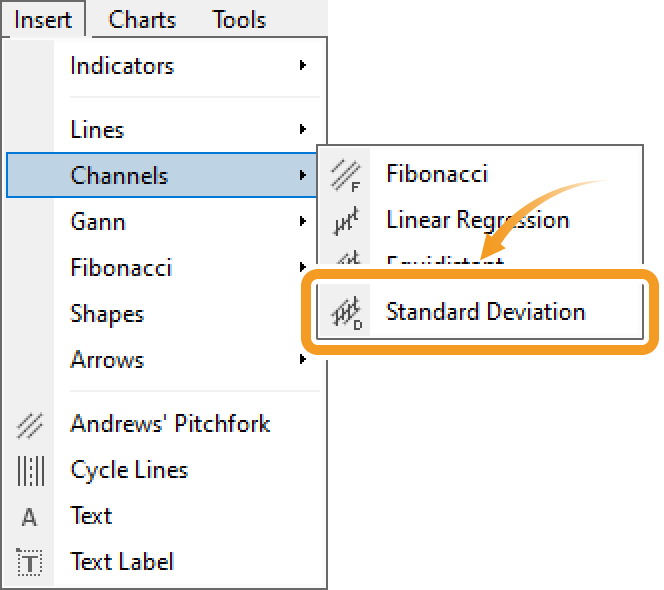
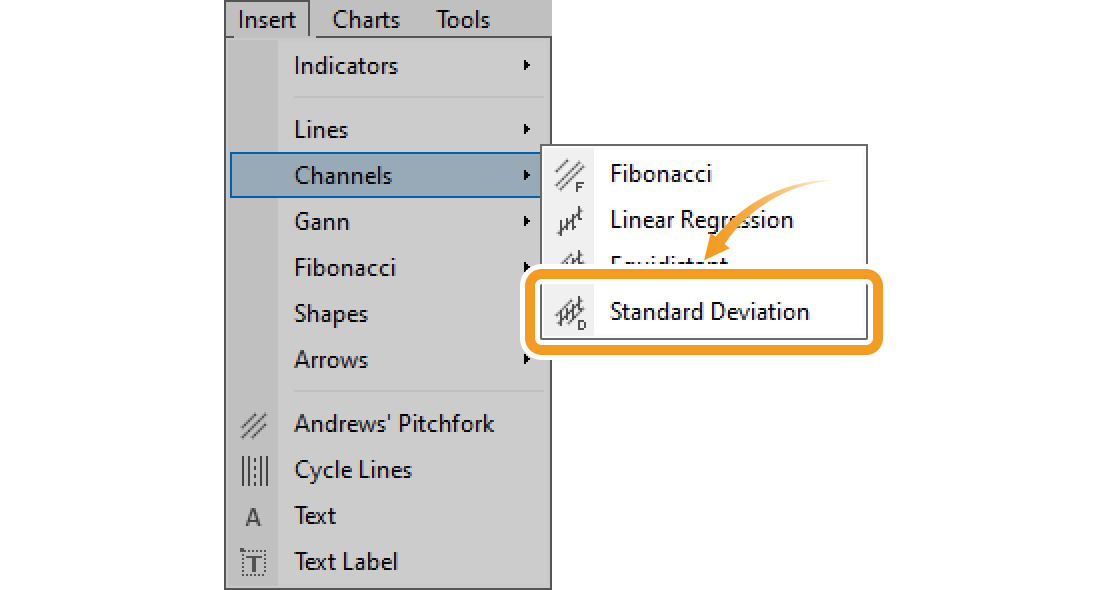
The button for drawing the standard deviation channel is not in the toolbar by default, but the button can be made to appear by customizing the toolbar.
Related article: Customize toolbar buttons
In MT4, 5 types of channels are available, including the Andrews' Pitchfork, which is on the "Insert" menu.
-
Fibonacci
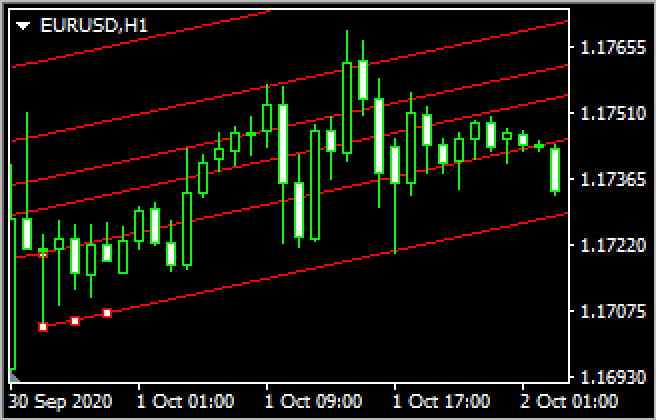
Fibonacci channel uses the trendline and creates parallel channel lines using the Fibonacci ratio.
-
Linear regression
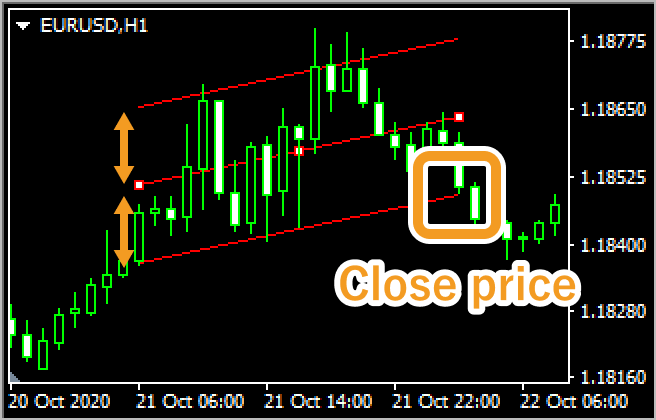
Draws a center line (regression line) using the close price of each candle, and then draws equally spaced two parallel lines above and below it. The parallel lines pass through the close price farthest from the center line.
-
Equidistant channel
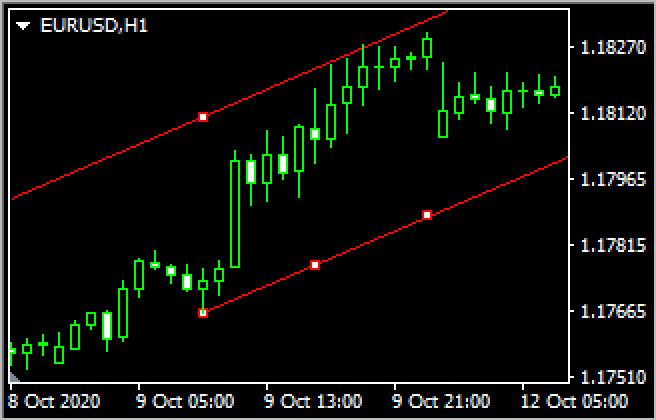
Draws two parallel lines. Each line can be moved separately while keeping them parallel.
-
Standard deviation
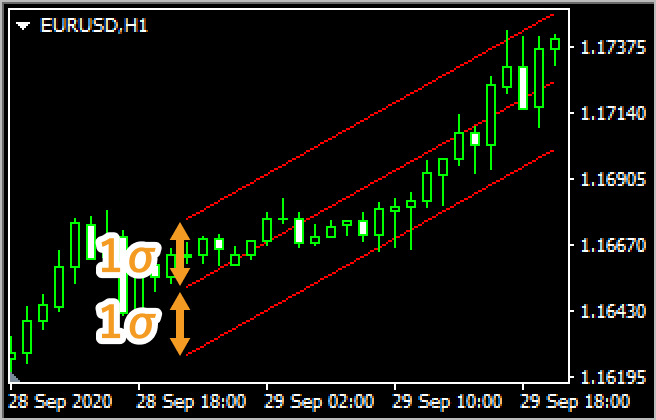
Draws a center line (regression line) using the close price of each candle, and then draws two parallel lines at a distance of standard deviation from the center line.
-
Andrews' Pitchfork
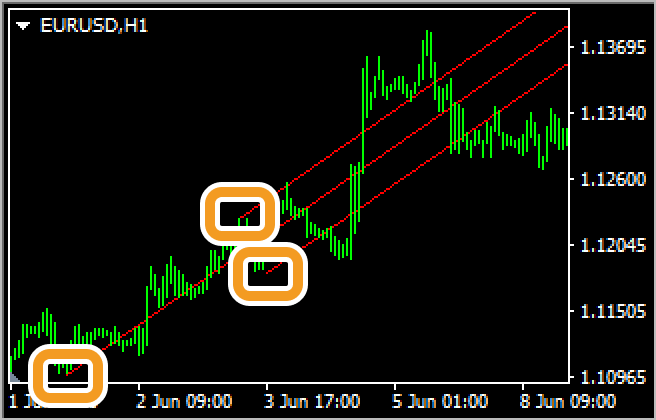
Three parallel lines are drawn using three points: the starting point of the trend and the high and low just after the trend.
Step 2
Click the starting point on the chart and drag it to the end point to create the standard deviation channel.
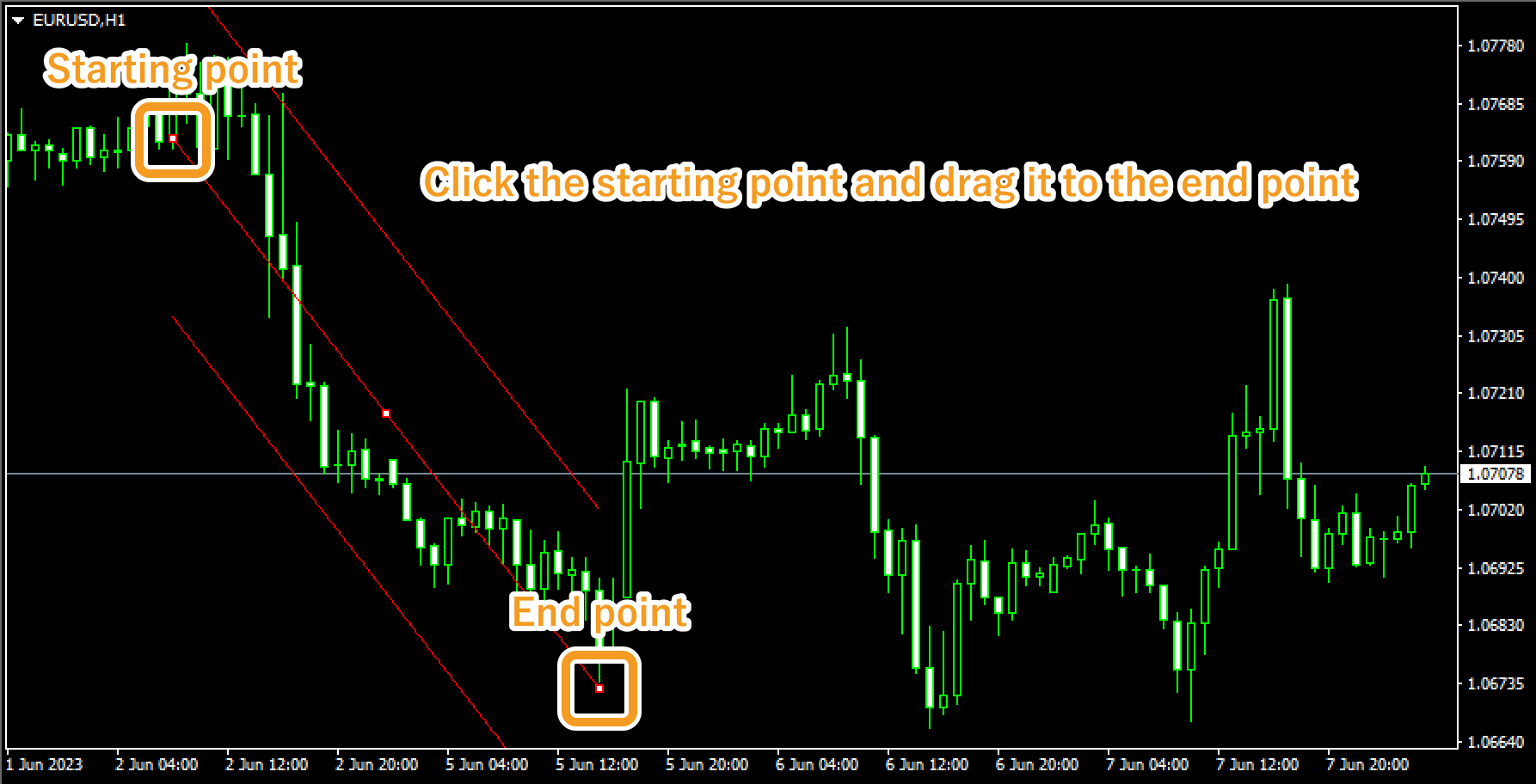
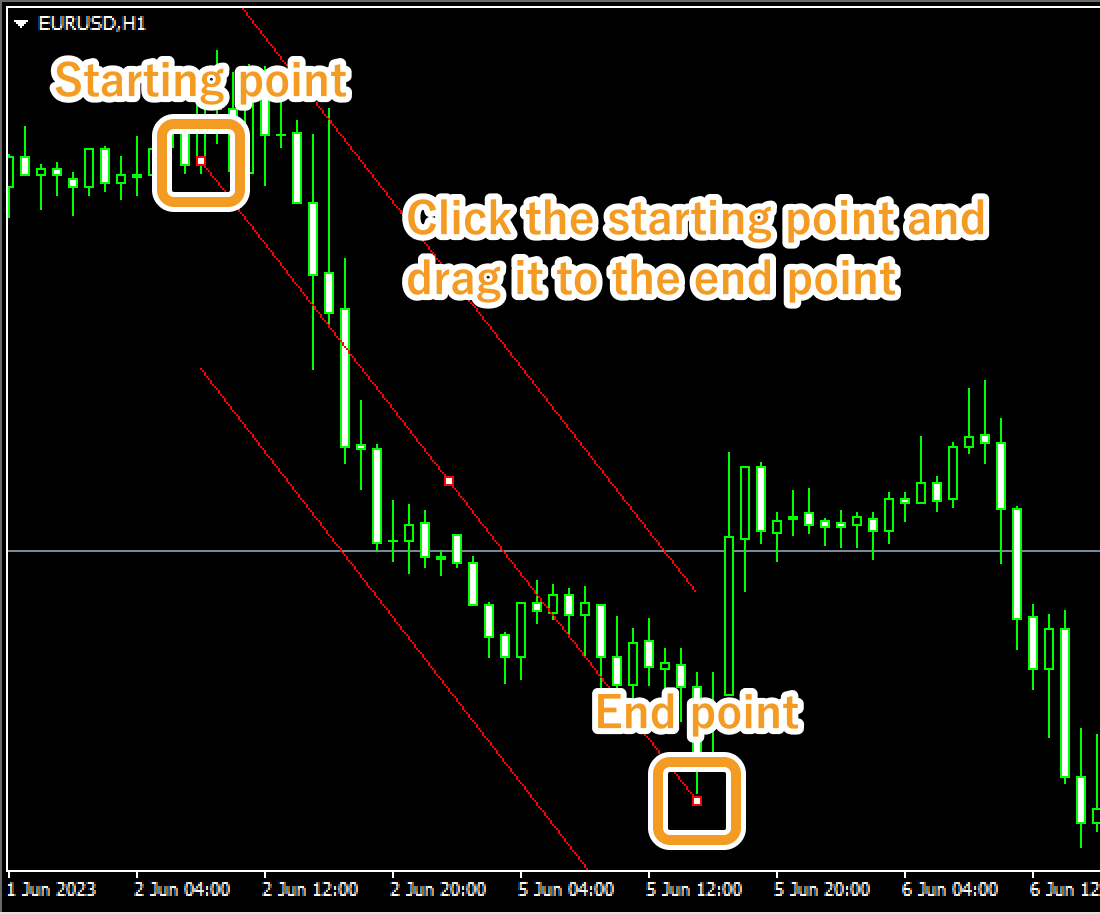
Step 3
If you want to adjust the position of standard deviation channel, make sure the white dots are being displayed on the standard deviation channel and move each dot as necessary. If you cannot see the white dots, double-click near the standard deviation channel to display the white dots.
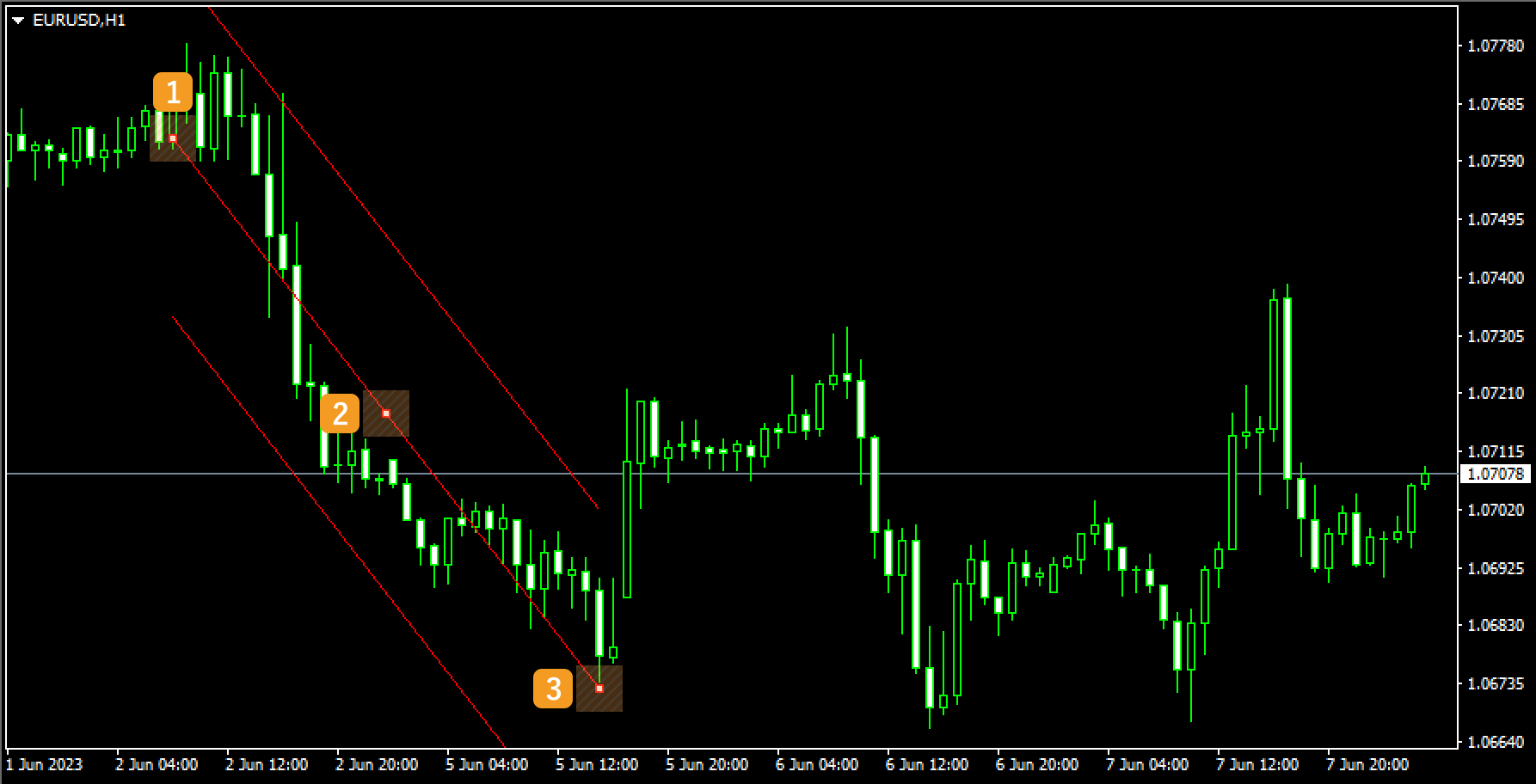
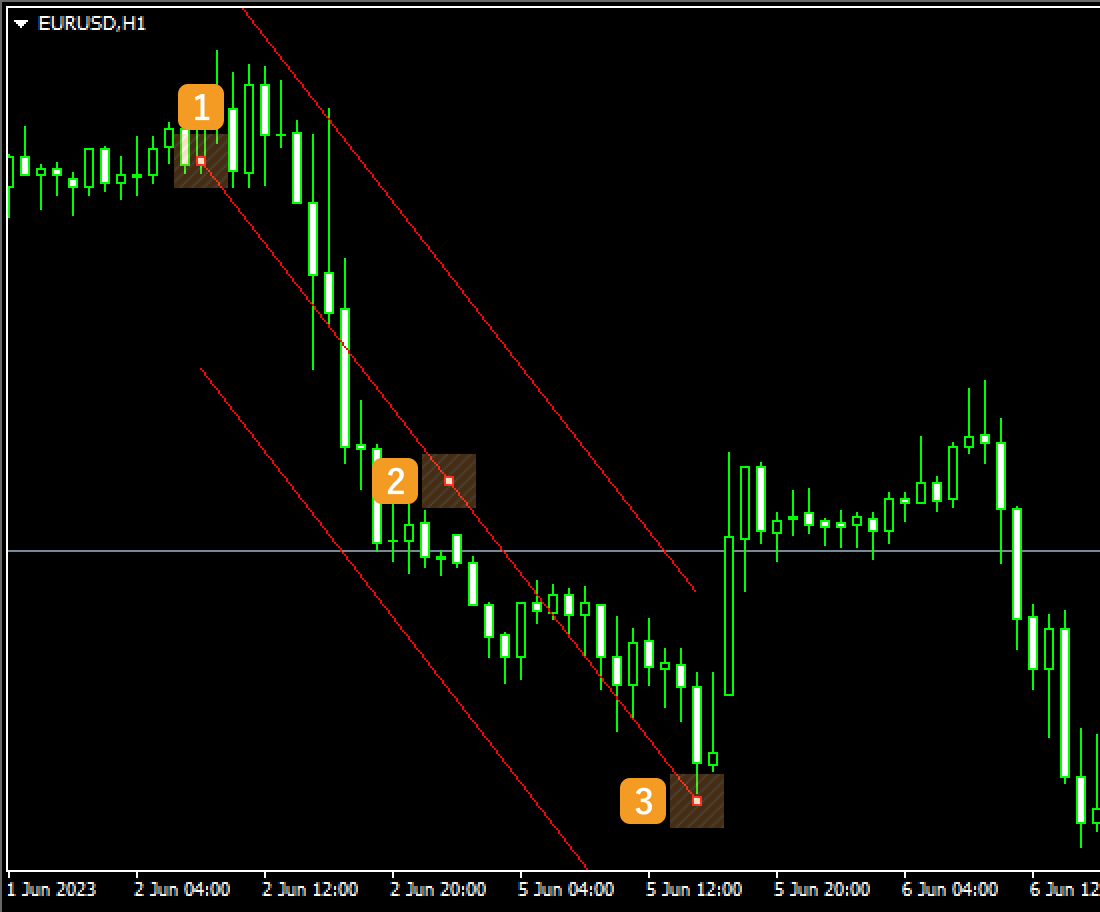
|
Number |
Descriptions |
|---|---|
|
1 |
Change the starting point of the standard deviation channel. |
|
2 |
Change the position of the standard deviation channel. |
|
3 |
Change the end point of the standard deviation channel. |
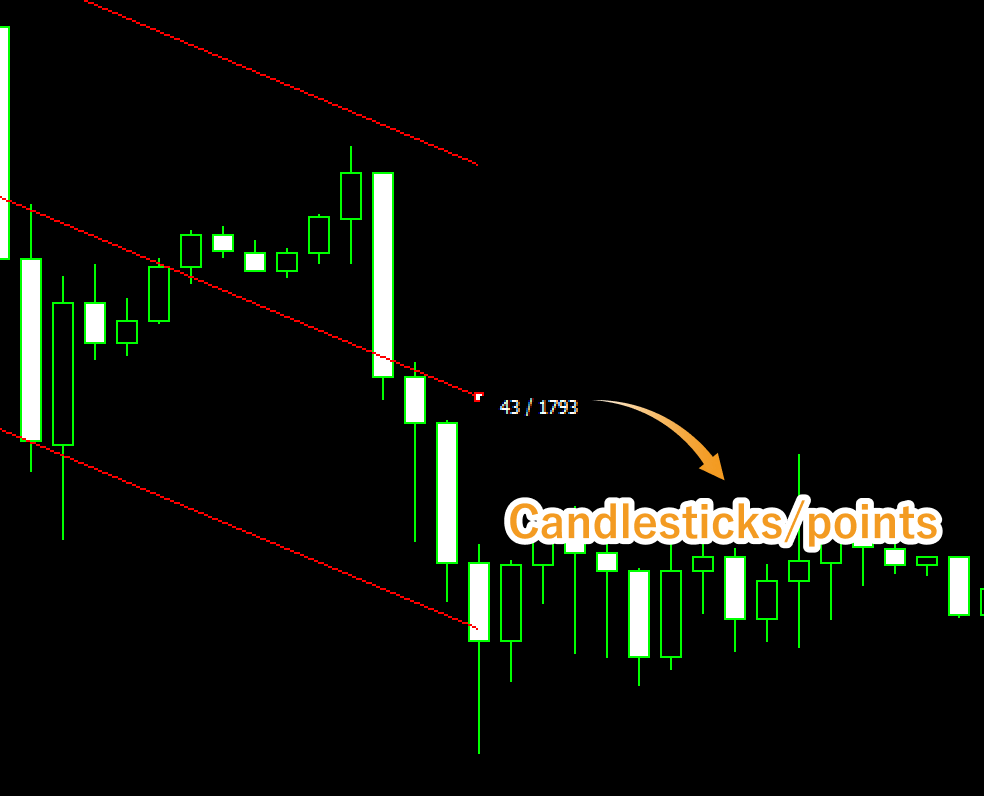
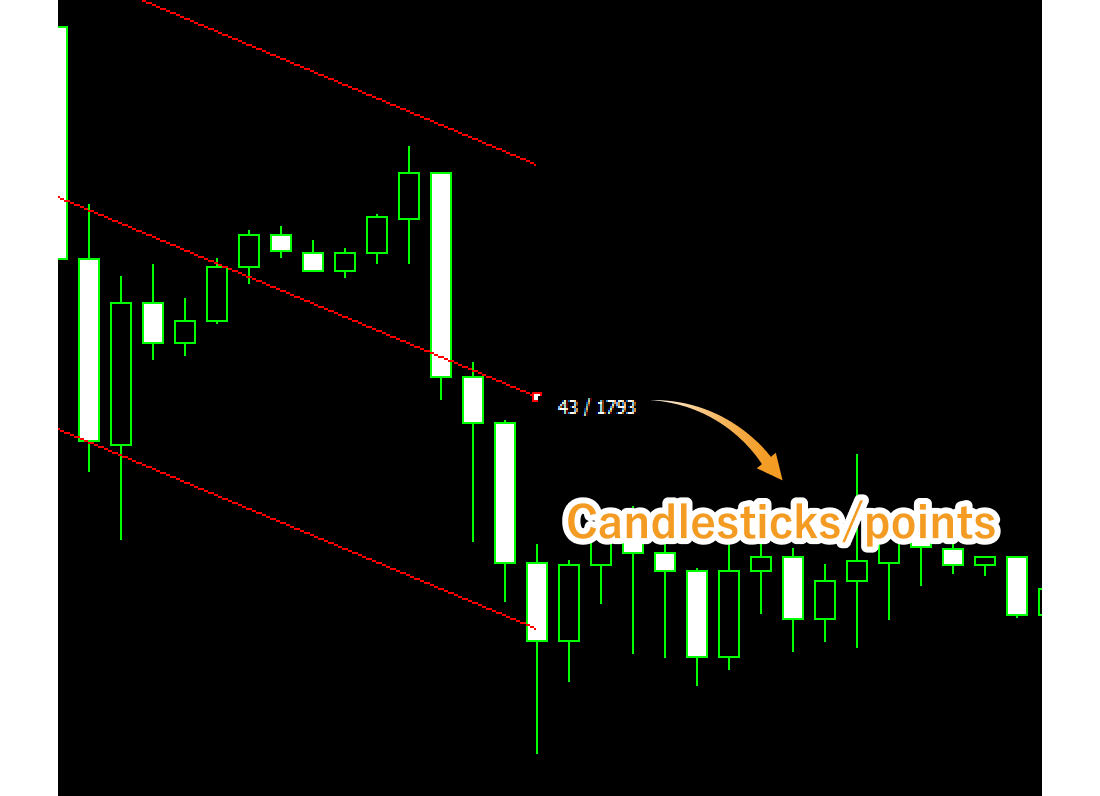
Values displayed when dragging indicate the numbers of candlesticks and points from the starting point to the end point.
Step 4
To modify the standard deviation channel settings, right-click near the linear regression line of the standard deviation channel and select "StdDev Channel properties...".
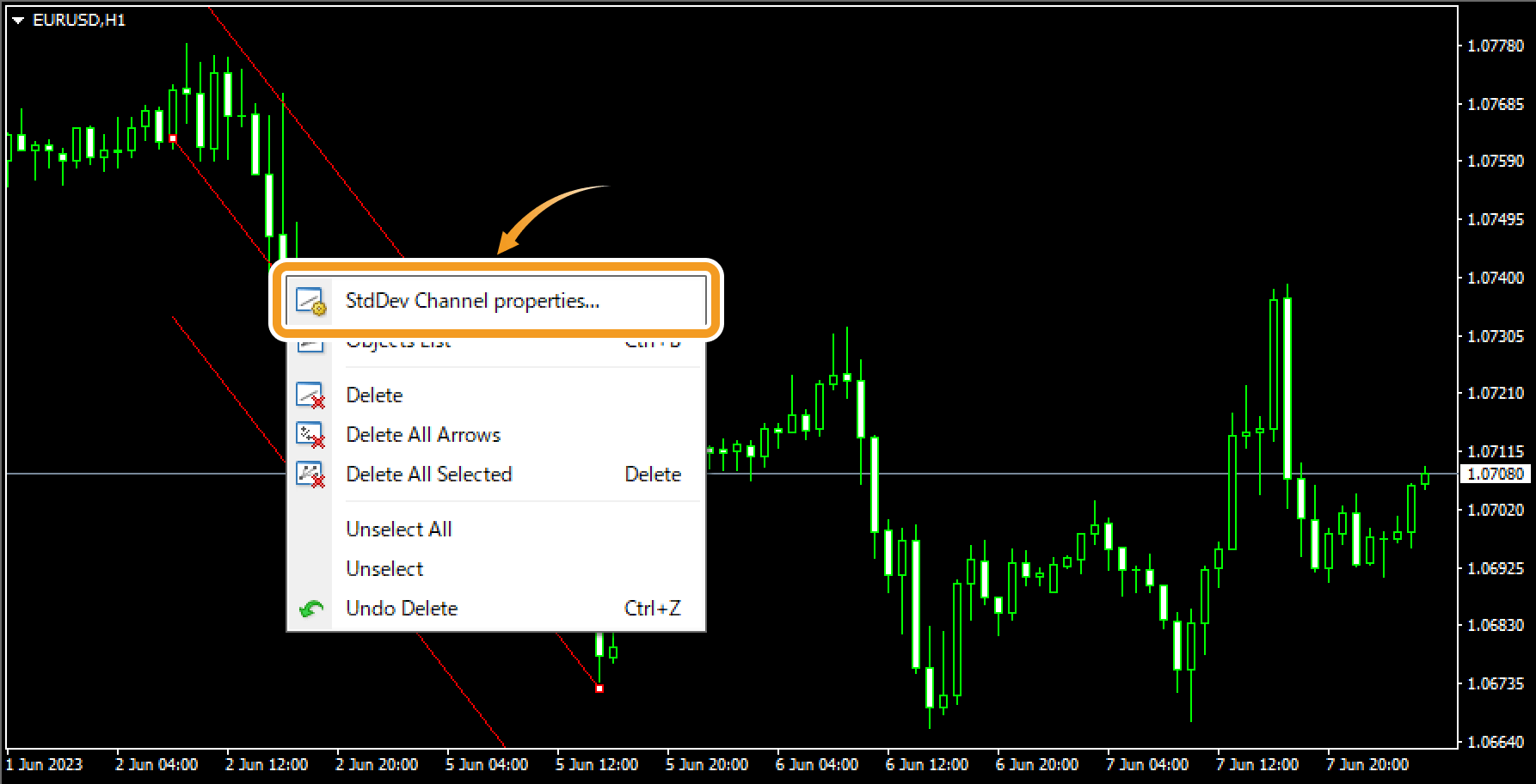
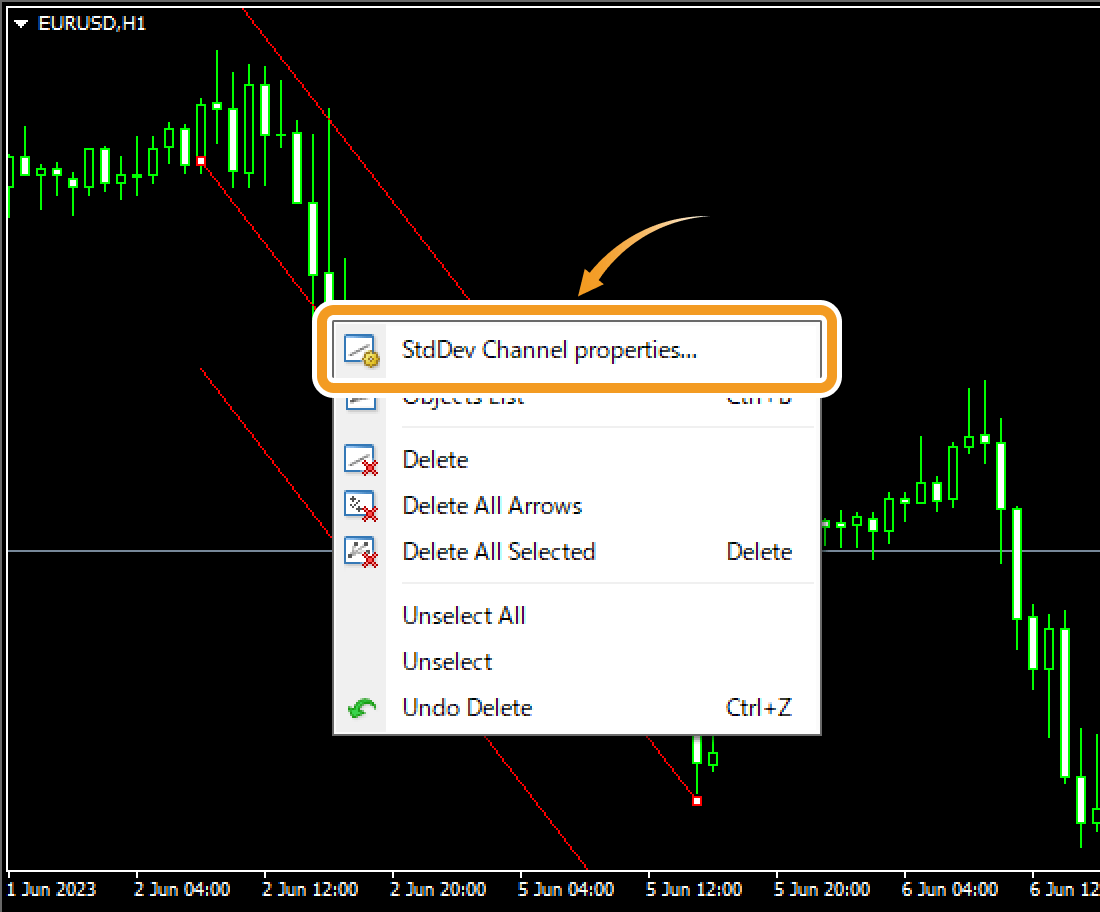
Step 5
On the "Properties" window, edit the parameters in the "Common", "Parameters", and "Visualization" tabs and click "OK".
"Common" tab
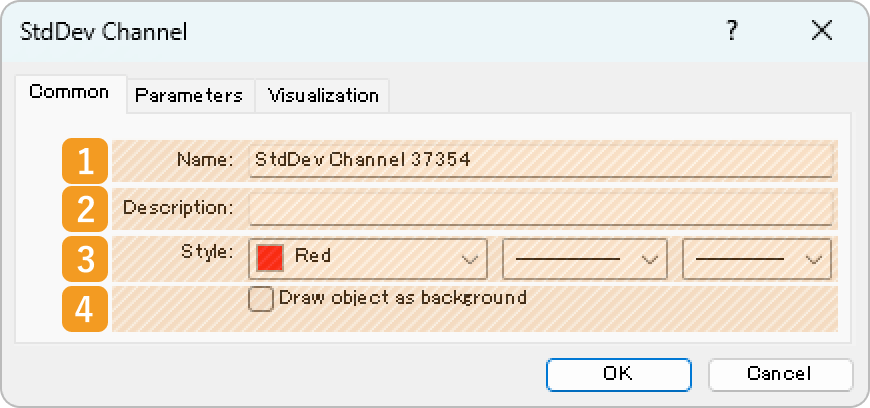
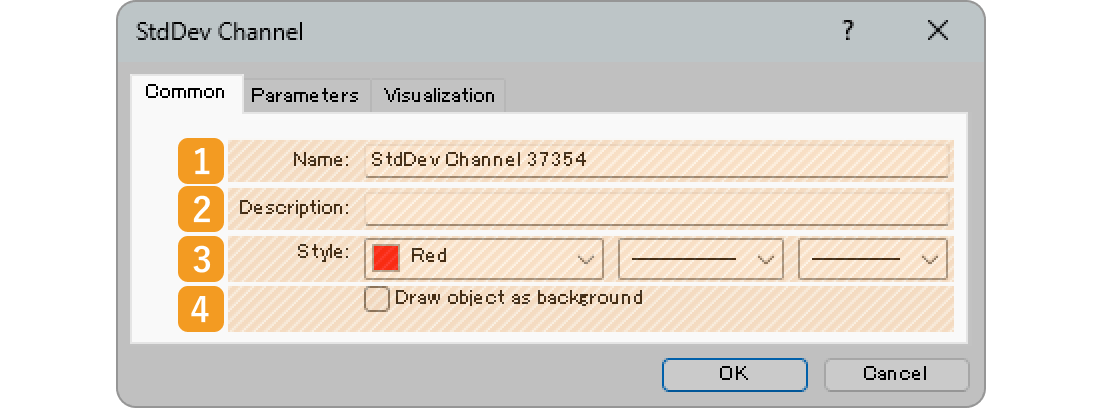
|
Number |
Item name |
Descriptions |
|---|---|---|
|
1 |
Name |
Name the standard deviation channel. |
|
2 |
Description |
The description can be displayed on the chart when hovering the pointer over the linear regression line. |
|
3 |
Style |
Set the color, line type, and line thickness for the standard deviation channel. |
|
4 |
Draw object as background |
Check this box if you want to place the standard deviation channel behind the chart. |
"Parameters" tab
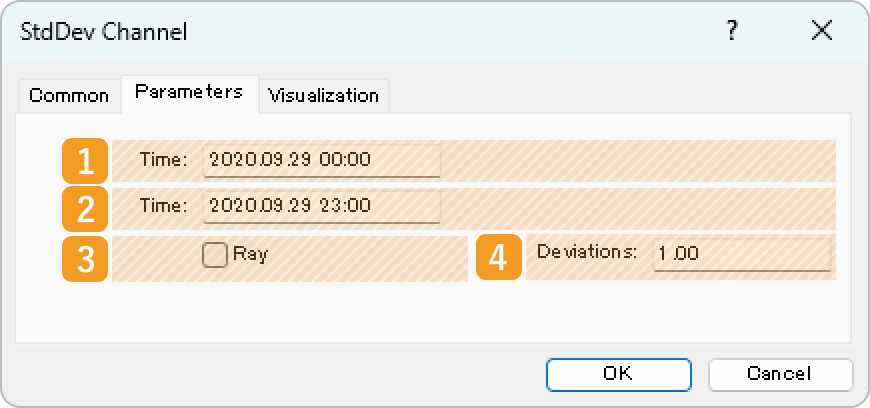
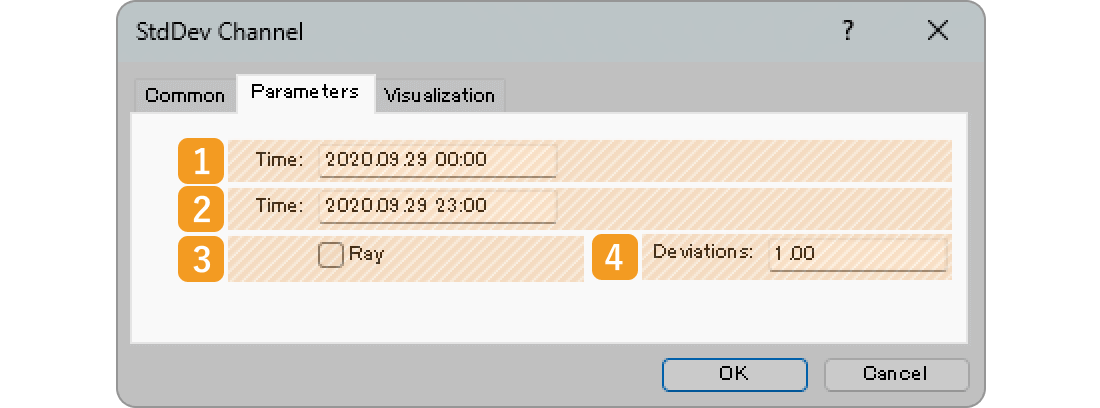
|
Number |
Item name |
Descriptions |
|---|---|---|
|
1 |
Starting point position |
Specify the starting point position by date and time. |
|
2 |
End point position |
Specify the end point position by date and time. |
|
3 |
Ray |
Check this box to extend the standard deviation channel to the right. |
|
4 |
Deviations |
Set the standard deviation. If you set it to "2", the standard deviation channel will be formed with ±2σ deviation. |
"Ray" is a parameter that can be set on an object such as a channel to extend the line beyond its end point. This makes it easier to analyze, as the line will be extended into the future, based on the price movement between the starting point and the end point at a certain point in time.
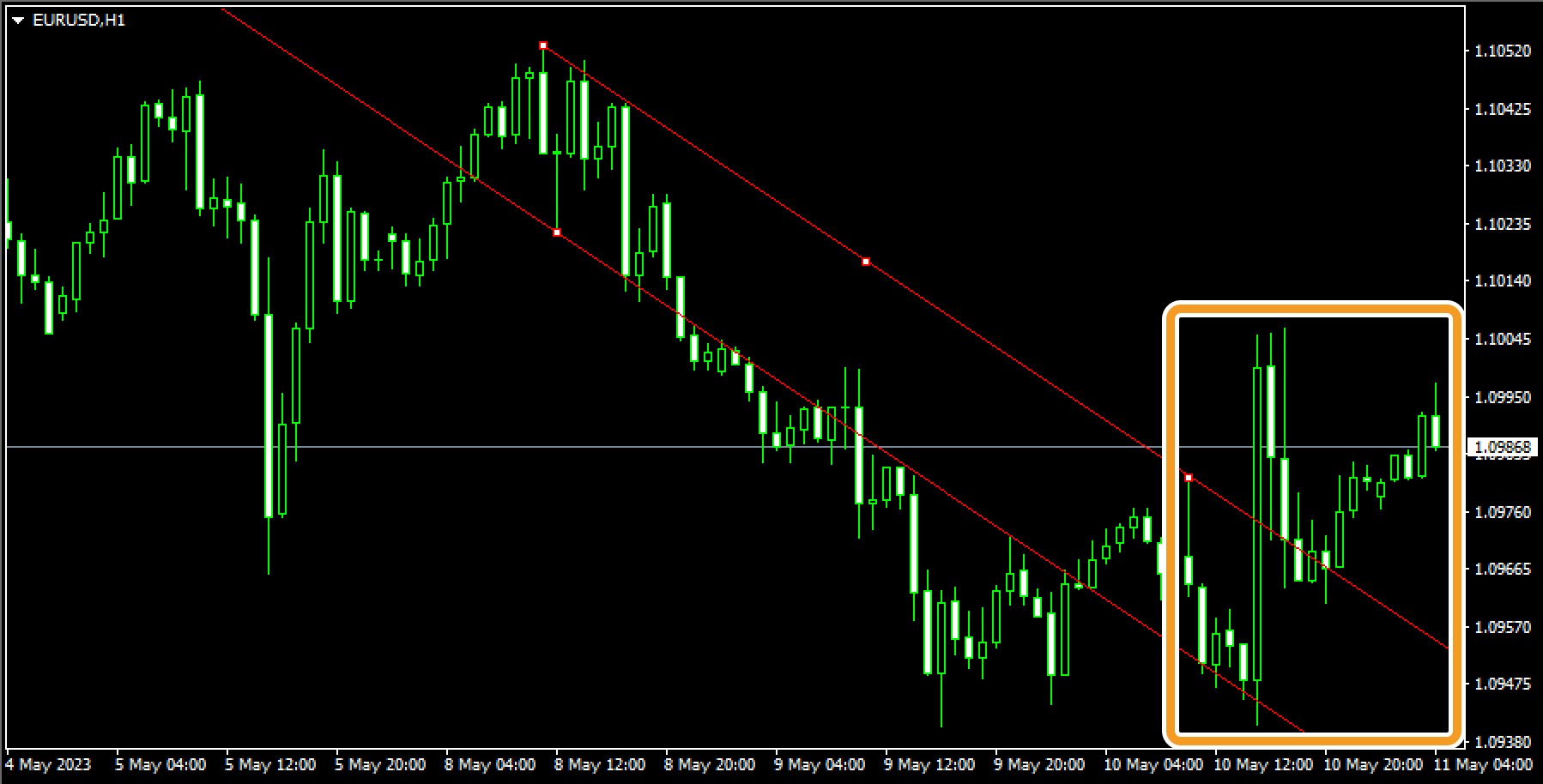
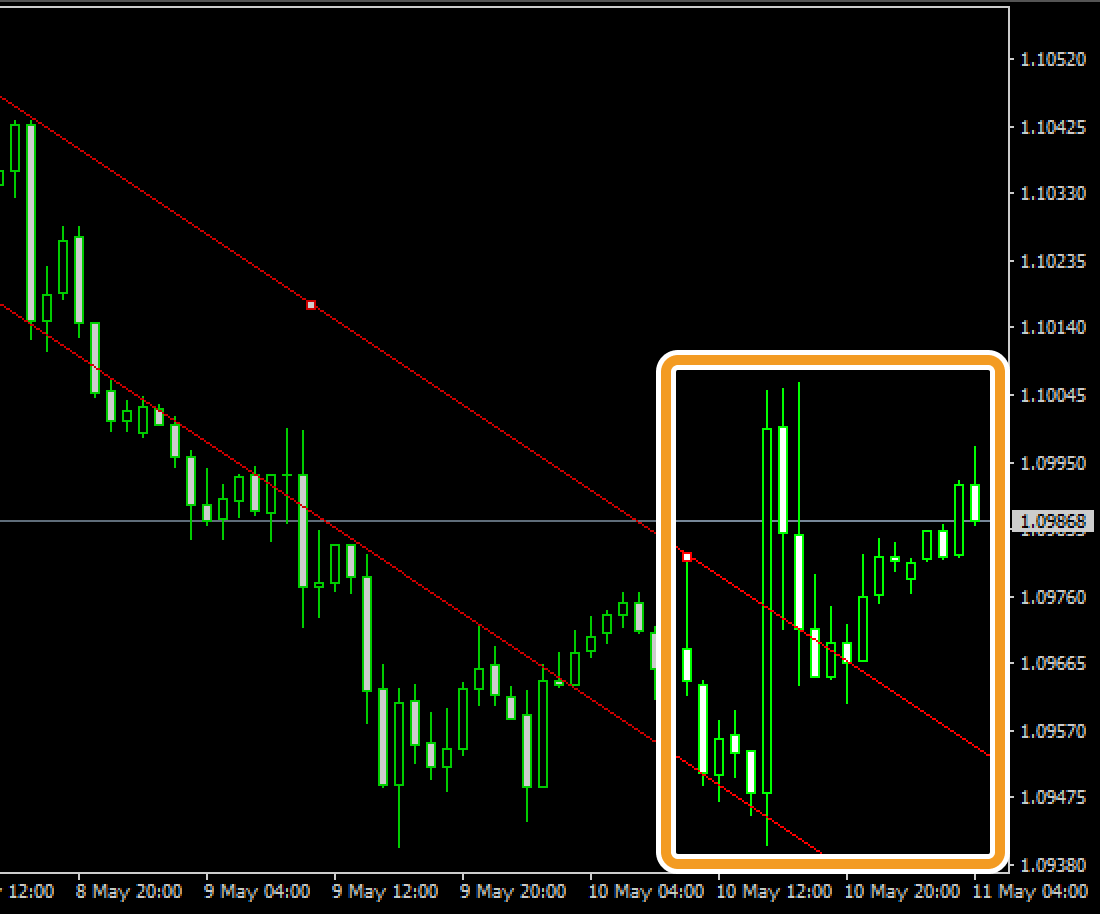
"Visualization" tab
On the "Visualization" tab, you can specify the timeframes to use the standard deviation channel with.
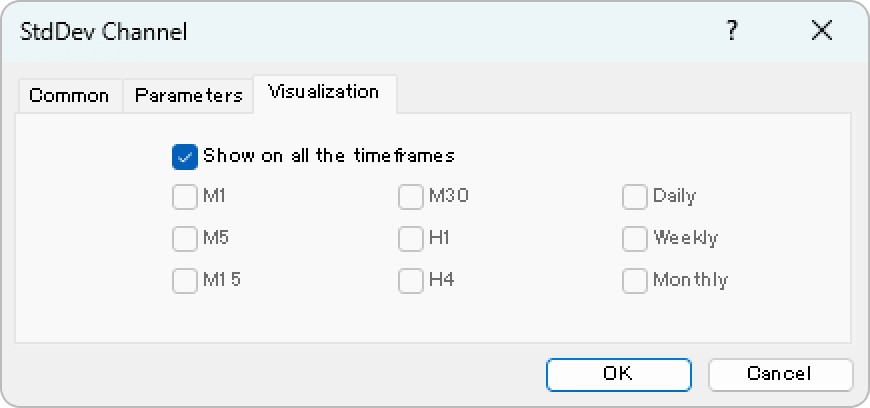
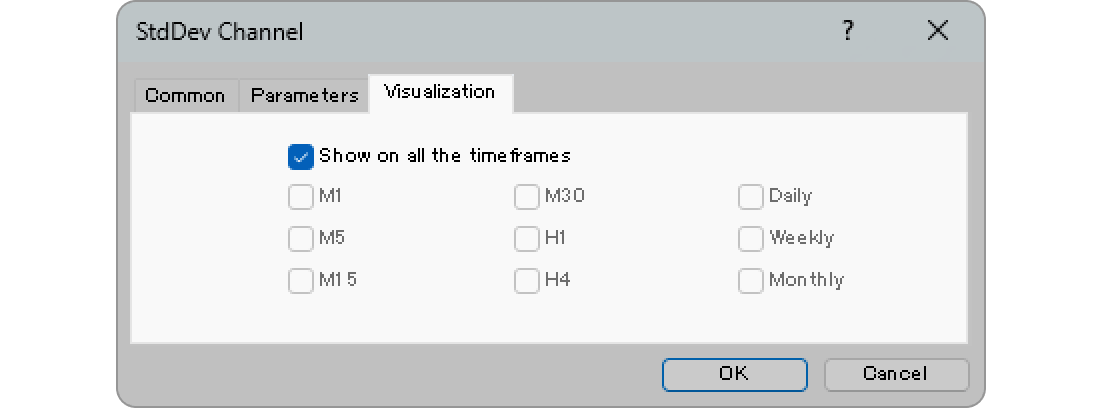
Step 1
Click "Insert" in the menu. Hover the pointer over "Objects" > "Channels" and select "StdDev Channel".
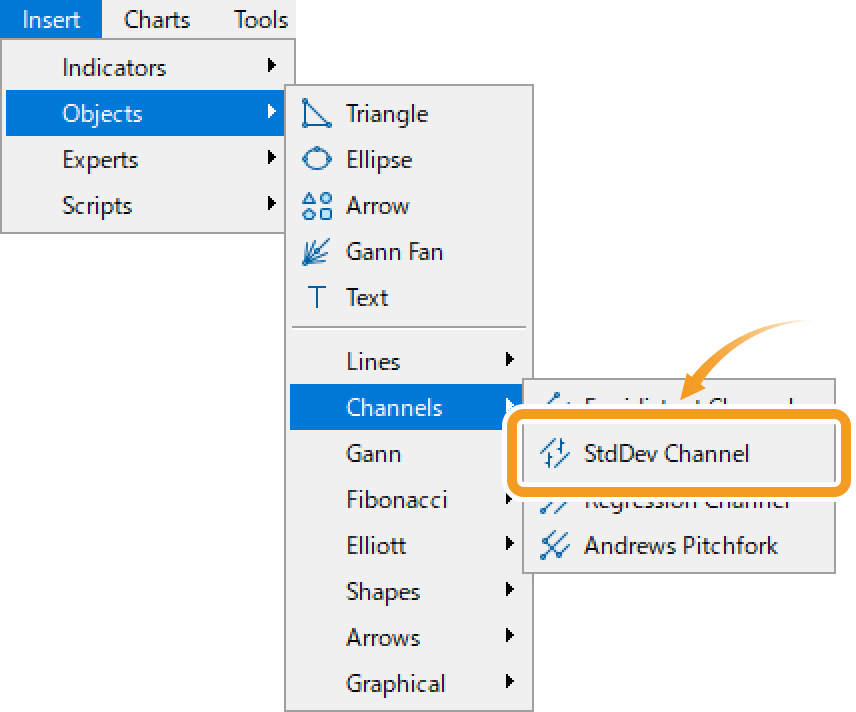
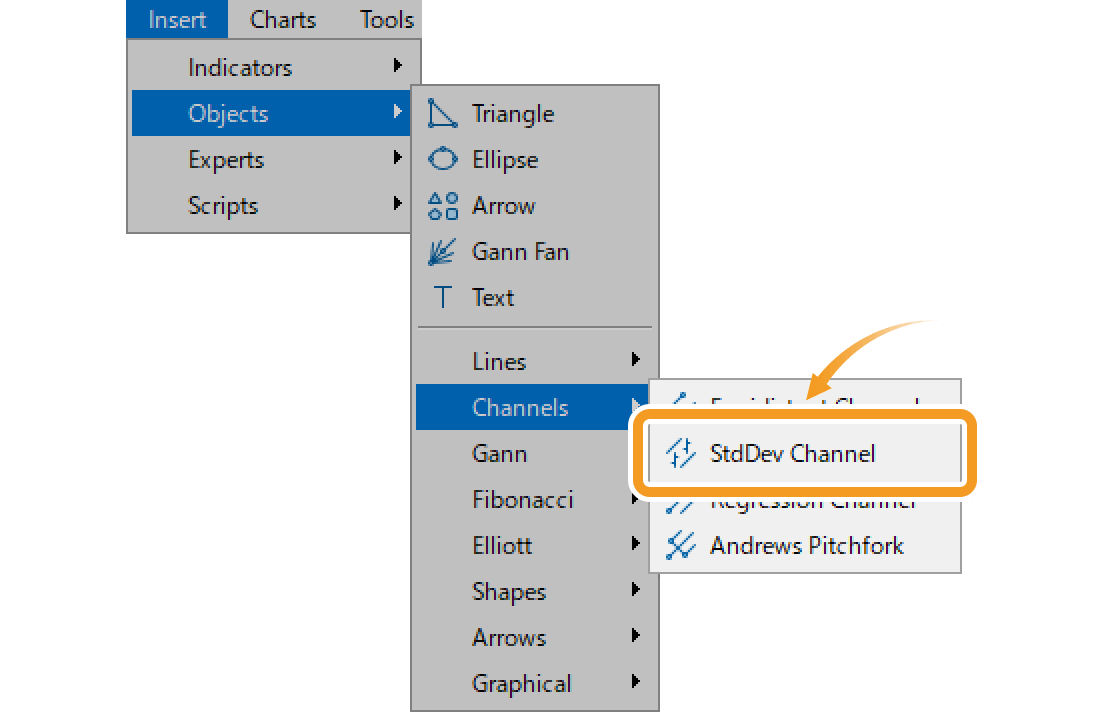
The button for drawing the standard deviation channel is not in the toolbar by default, but the button can be made to appear by customizing the toolbar.
Related article: Customize toolbar buttons
On MT5, five types of channels can be drawn including the Fibonacci channel in the "Fibonacci" menu.
-
Equidistant channel
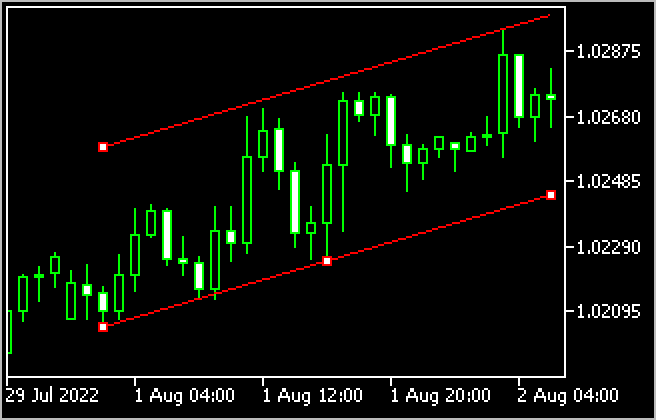
Draws two parallel lines. Each line can be moved separately while keeping them parallel.
-
Standard deviation
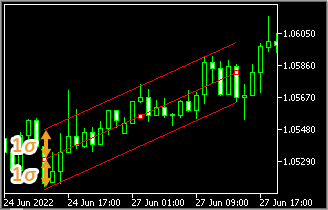
Draws a center line (regression line) using the close price of each candle, and then draws two parallel lines at a distance of standard deviation from the center line.
-
Linear regression
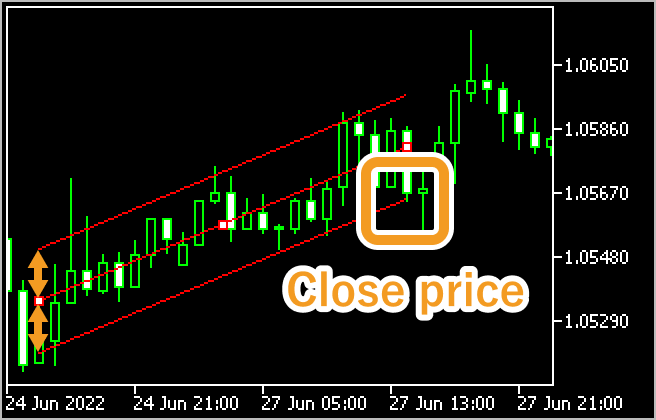
Draws a center line (regression line) using the close price of each candle, and then draws equally spaced two parallel lines above and below it. The parallel lines pass through the close price farthest from the center line.
-
Andrews' Pitchfork
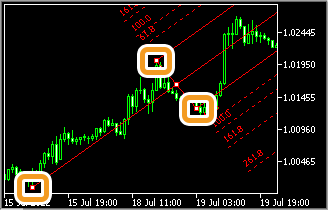
Three parallel lines are drawn using three points: the starting point of the trend and the high and low just after the trend.
-
Fibonacci
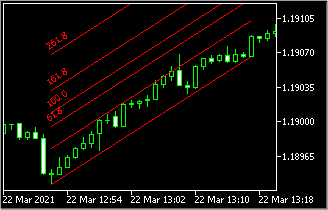
Fibonacci channel uses the trendline and creates parallel channel lines using the Fibonacci ratio.
Step 2
Click the starting point on the chart and drag it to the end point to create the standard deviation channel.
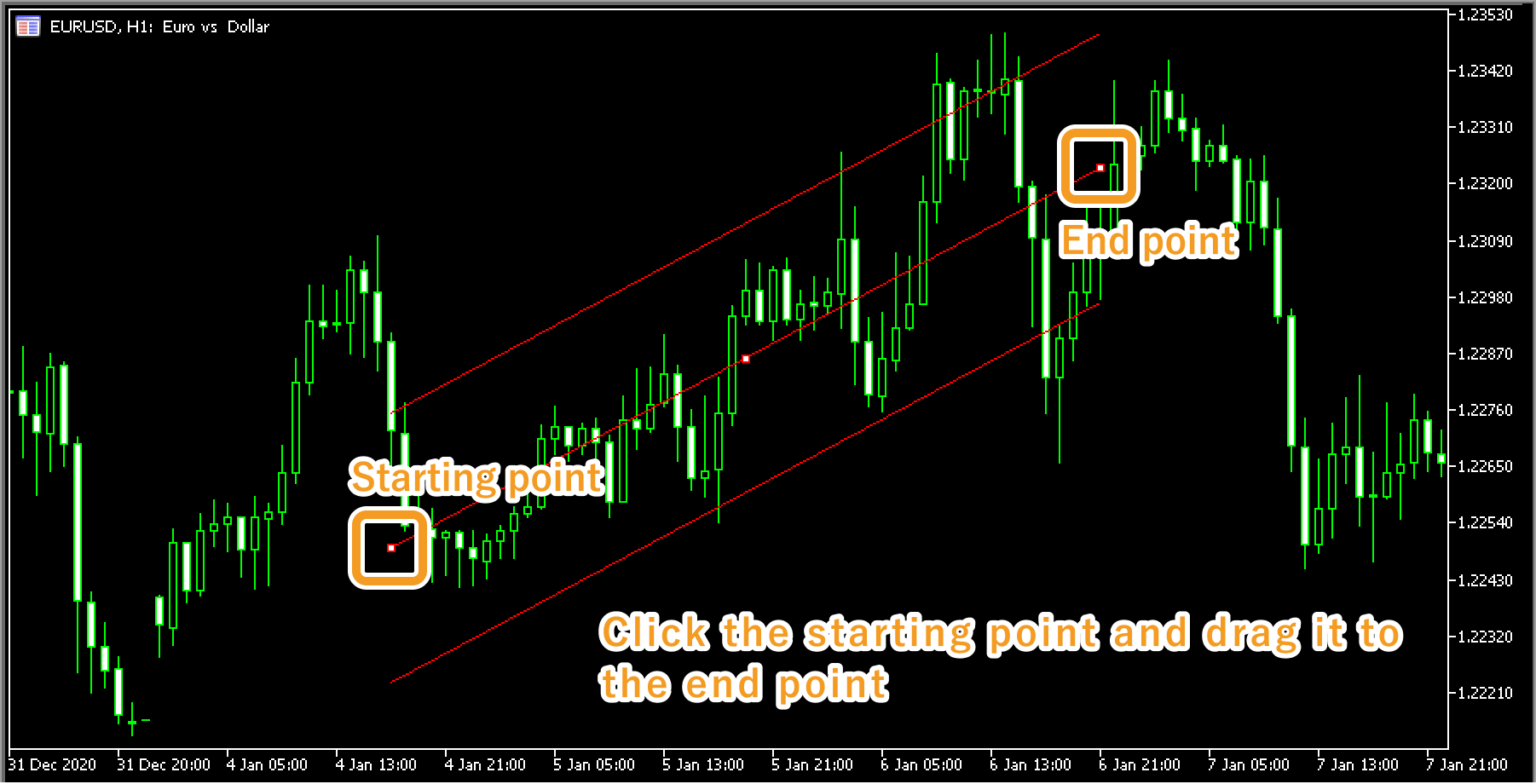
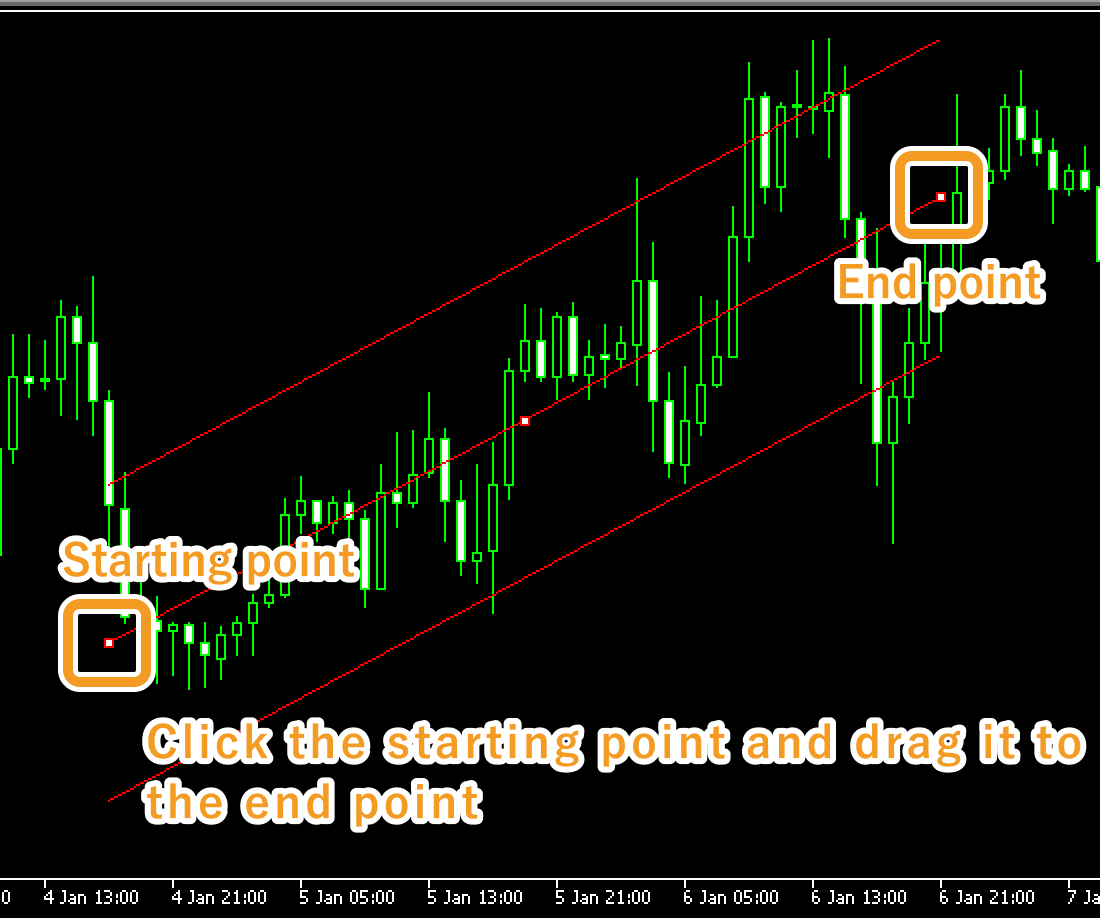
Step 3
If you want to adjust the position of standard deviation channel, make sure the white dots are being displayed on the standard deviation channel and move each dot as necessary. If you cannot see the white dots, double-click near the standard deviation channel to display the white dots.
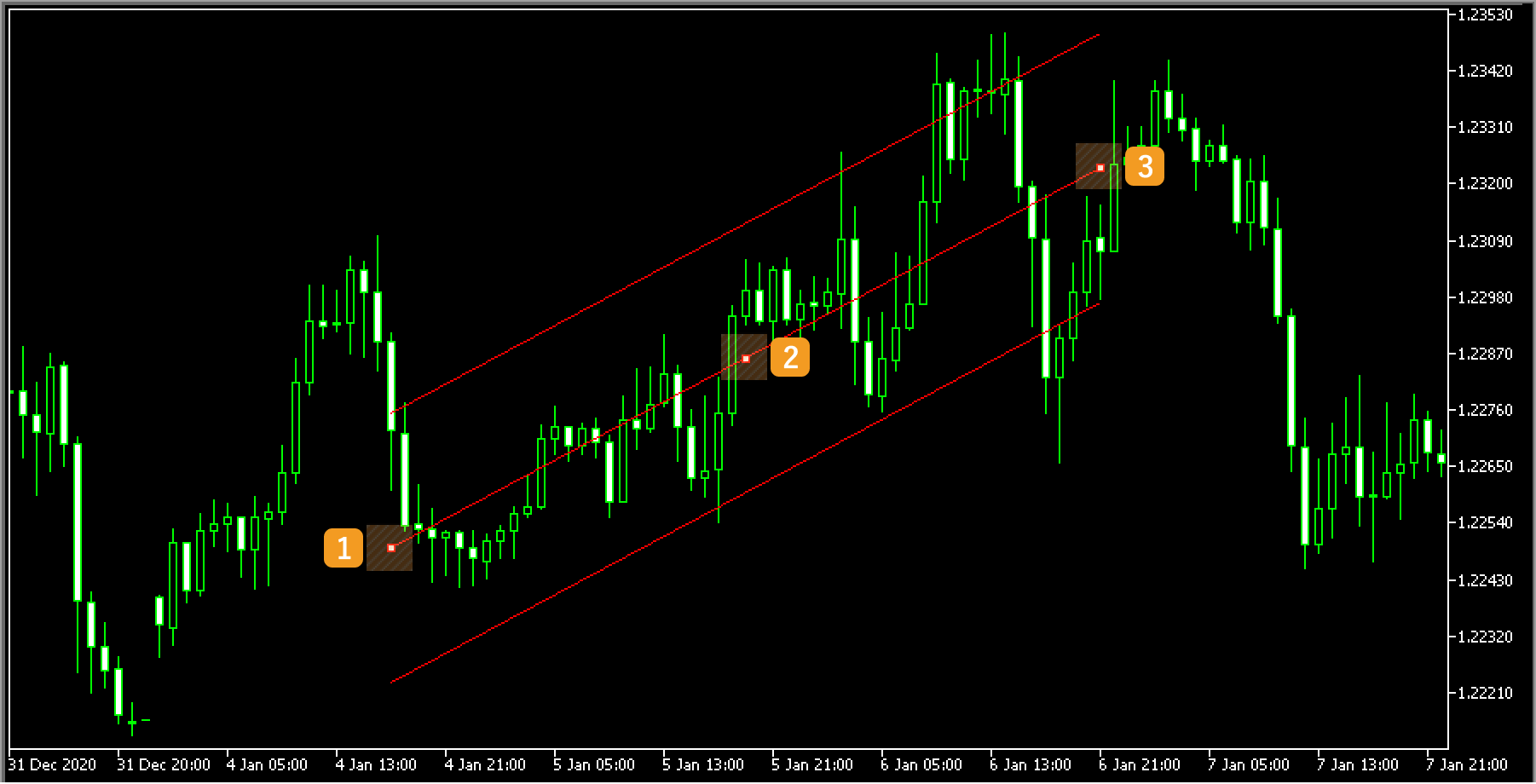
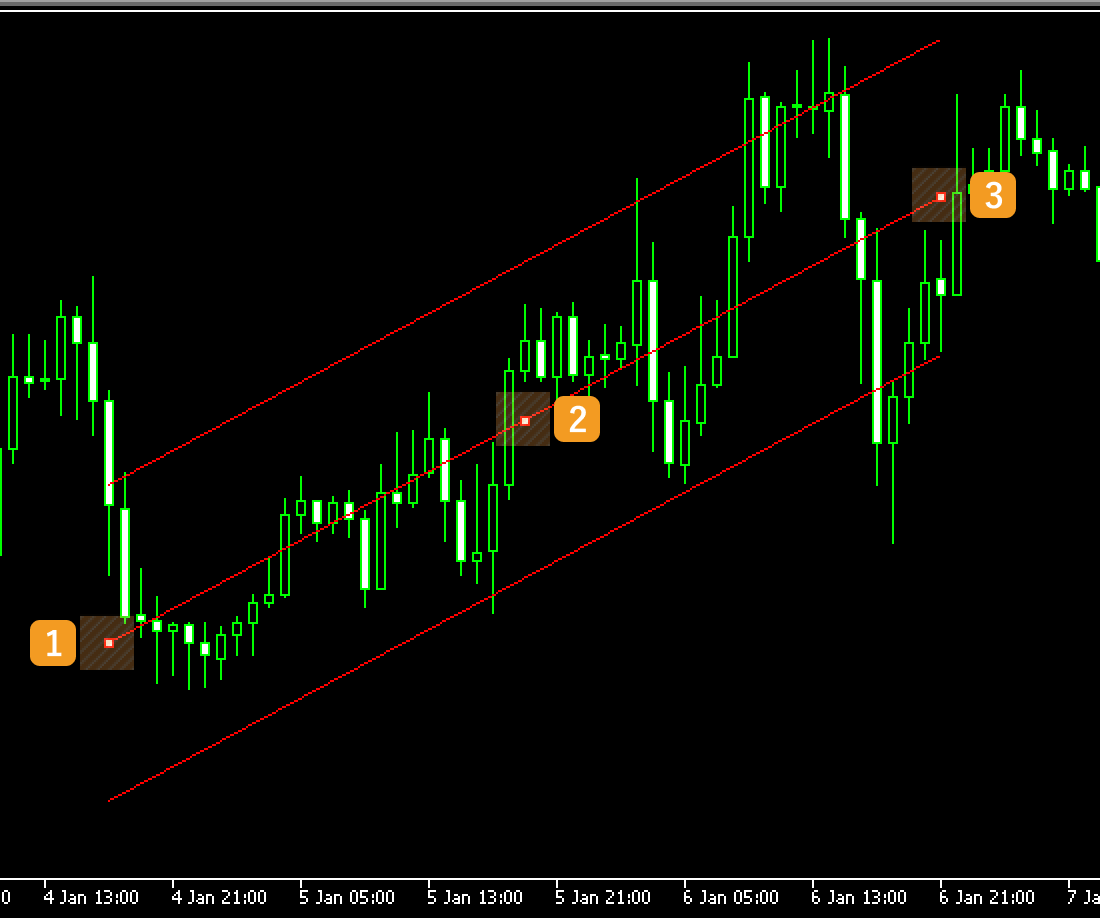
|
Number |
Descriptions |
|---|---|
|
1 |
Change the starting point of the standard deviation channel. |
|
2 |
Change the position of the standard deviation channel. |
|
3 |
Change the end point of the standard deviation channel. |
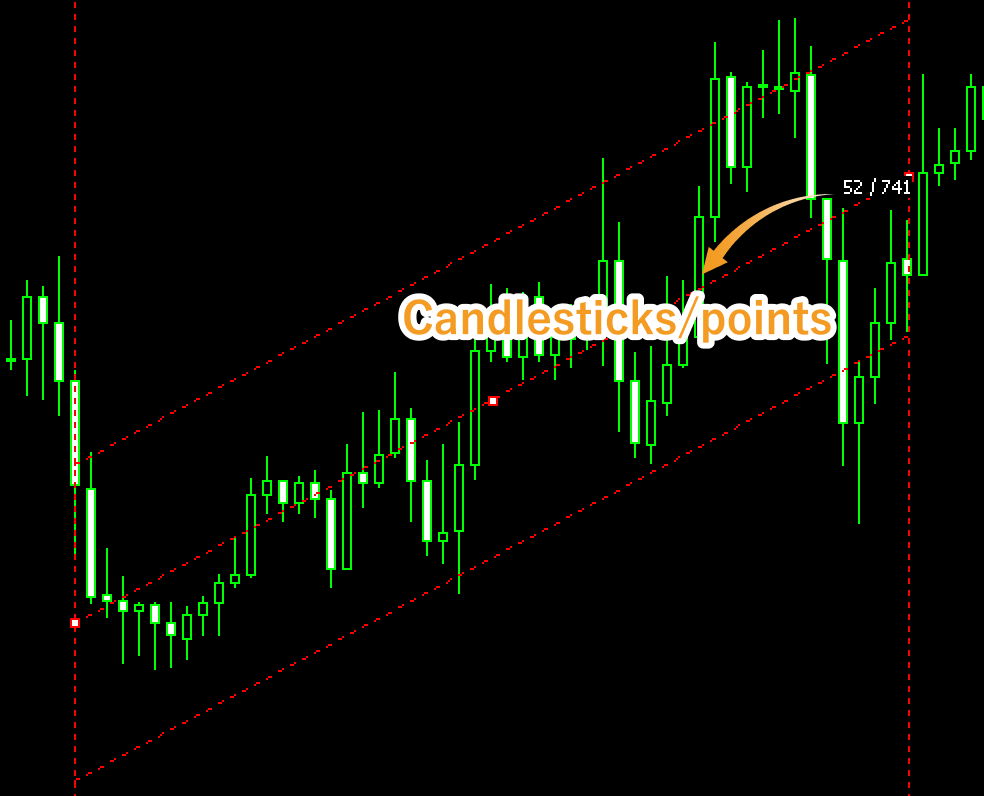
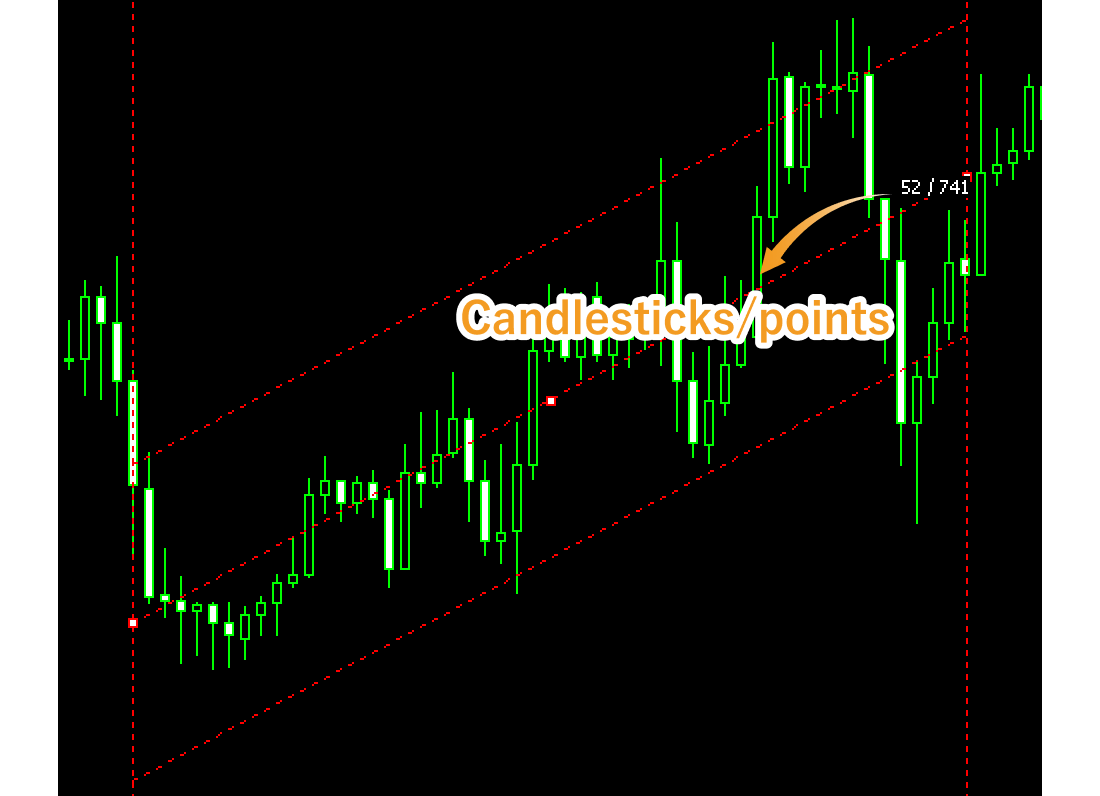
Values displayed when dragging indicate the numbers of candlesticks and points from the starting point to the end point.
Step 4
To modify the standard deviation channel settings, right-click near the linear regression line and select "Properties of (channel name)".
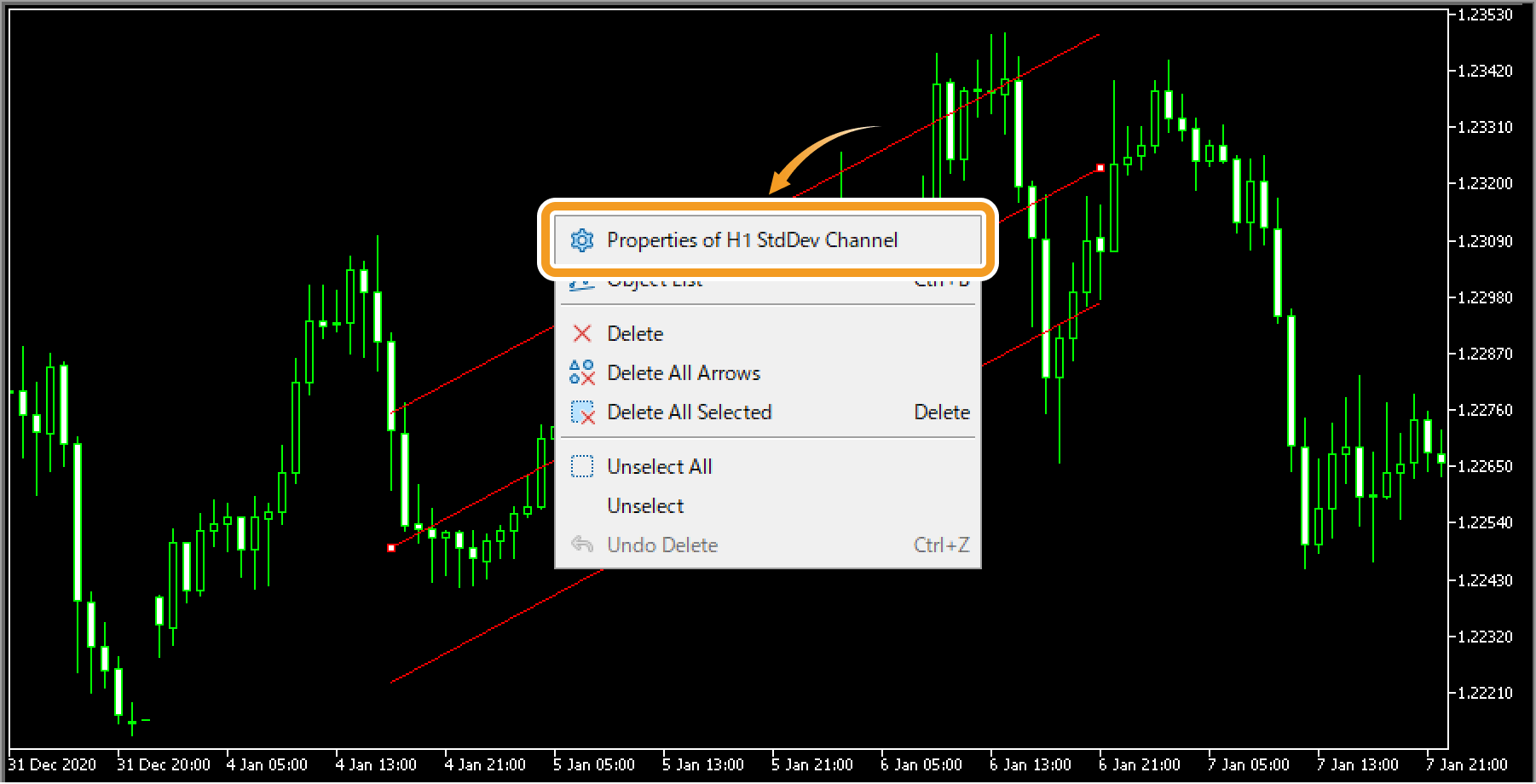
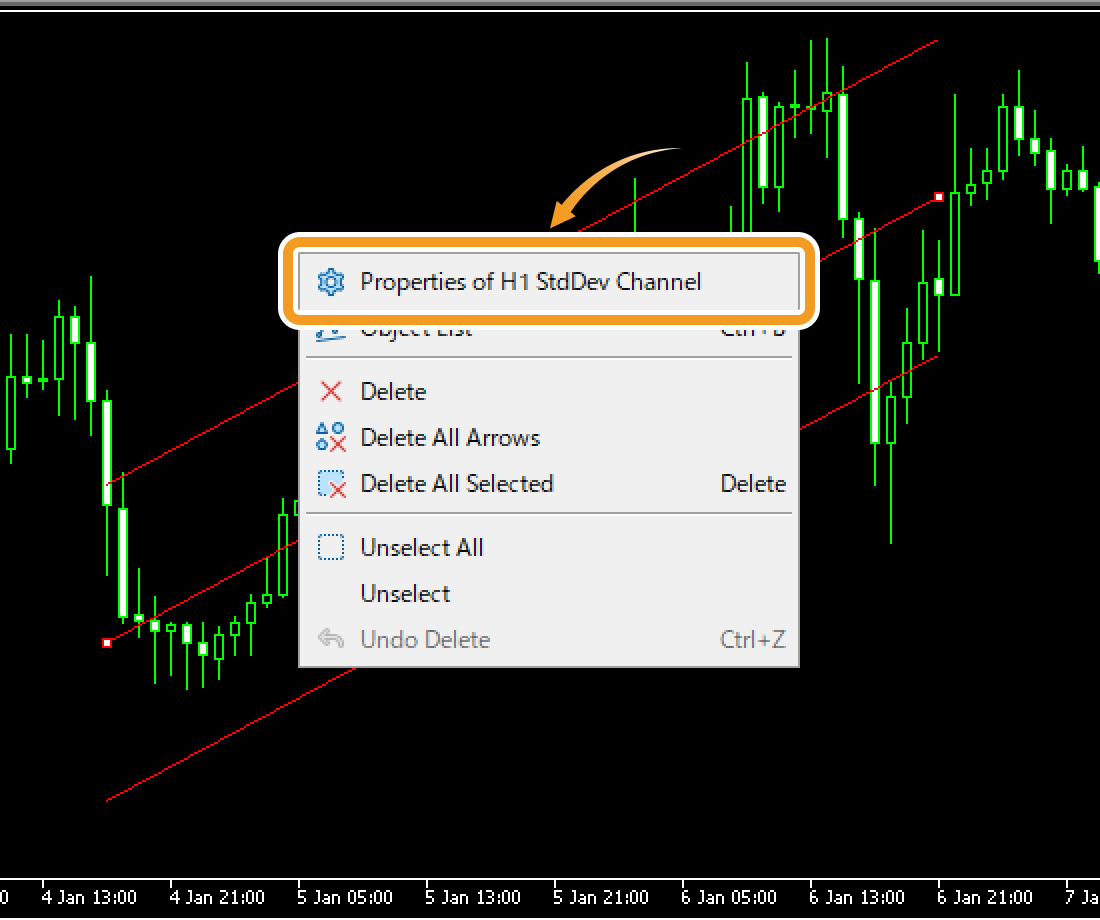
Step 5
On the "Properties" window, edit the parameters in the "Common", "Parameters", and "Visualization" tabs and click "OK".
"Common" tab
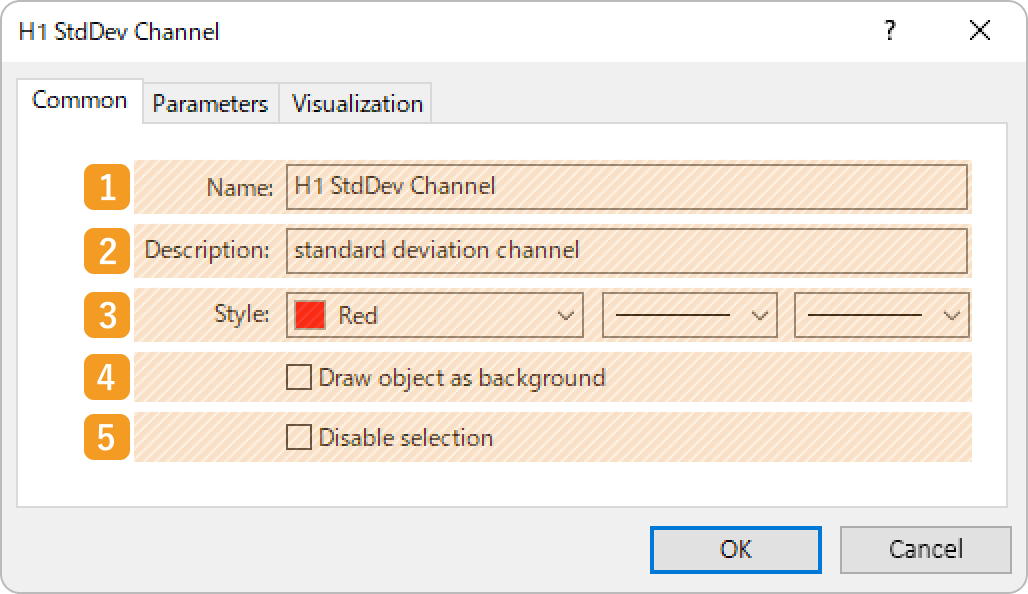
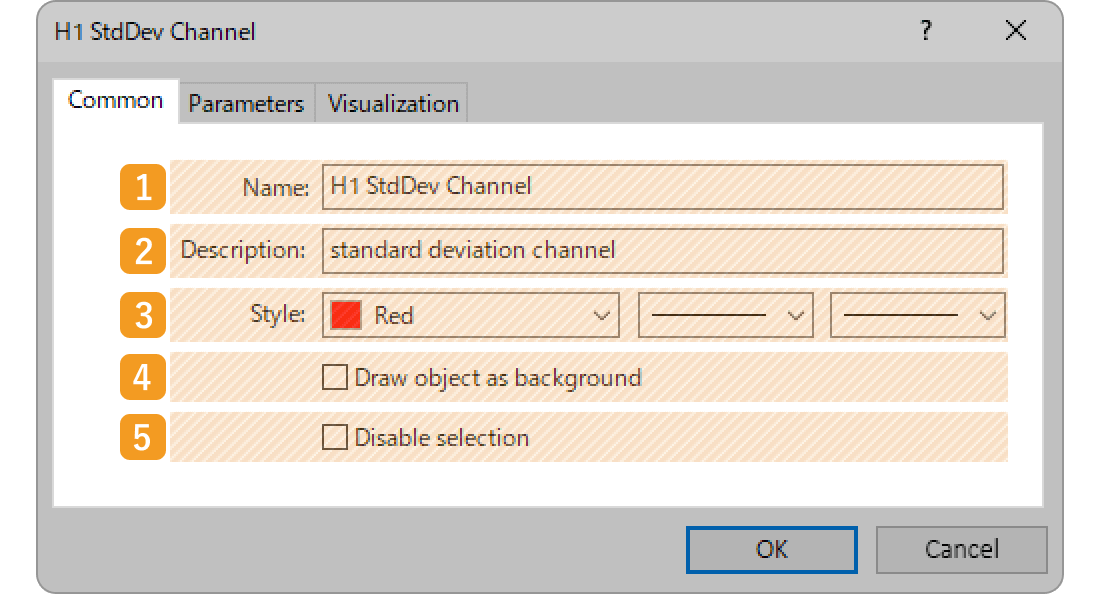
|
Number |
Item name |
Descriptions |
|---|---|---|
|
1 |
Name |
Name the standard deviation channel. |
|
2 |
Description |
The description of the standard deviation channel can be displayed on the chart. |
|
3 |
Style |
Set the color, line type, and line thickness for the standard deviation channel. |
|
4 |
Draw object as background |
Check this box if you want to place the standard deviation channel behind the chart. |
|
5 |
Disable selection |
Check this box if you want to disable the editing of the standard deviation channel. |
"Parameters" tab
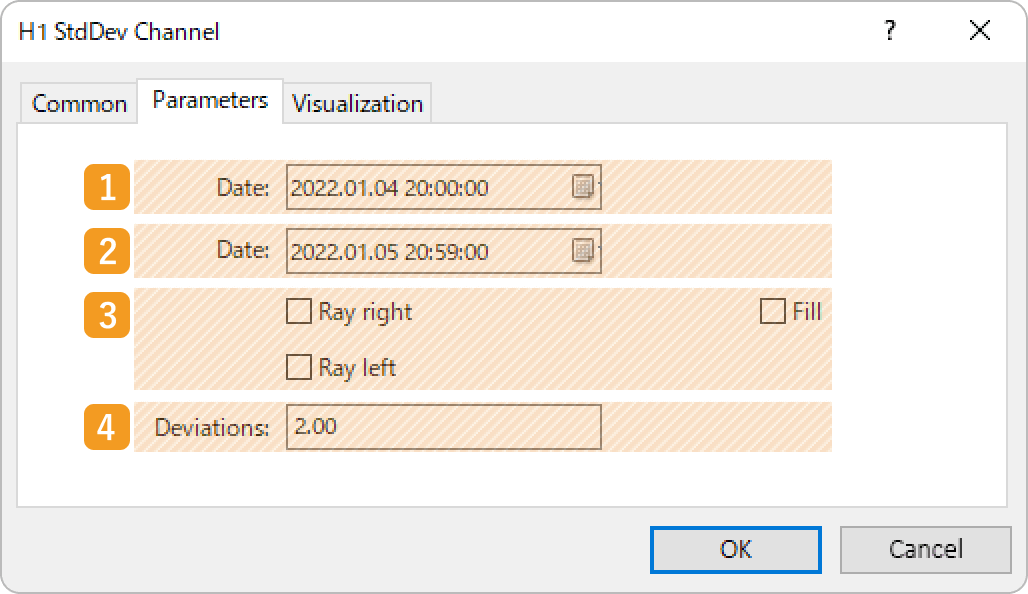
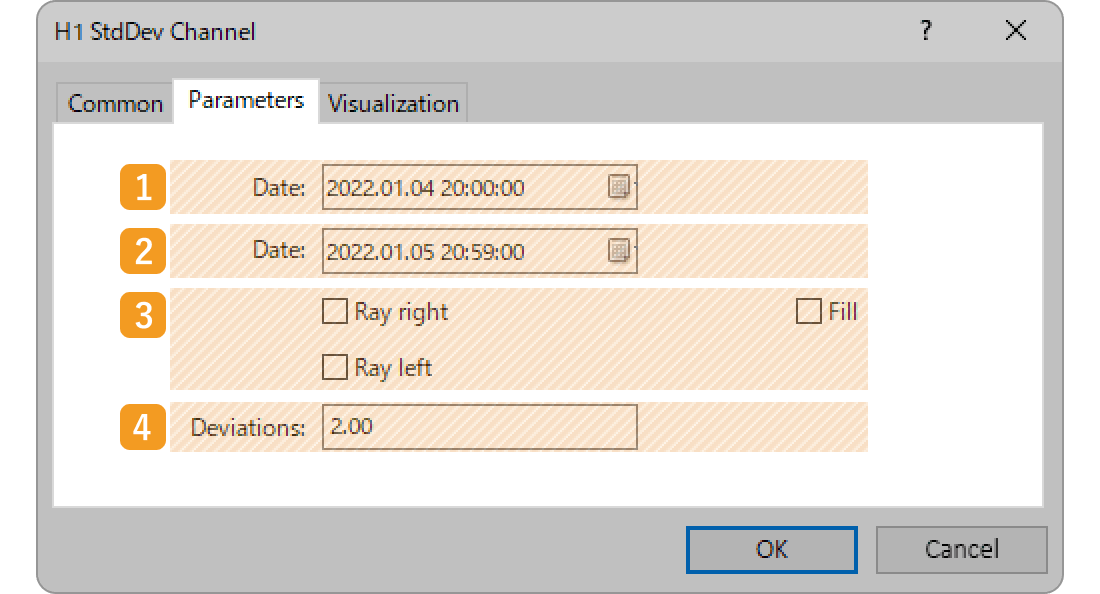
|
Number |
Item name |
Descriptions |
|---|---|---|
|
1 |
Starting point position |
Specify the starting point position by date and time. |
|
2 |
End point position |
Specify the end point position by date and time. |
|
3 |
Ray/Fill |
Check each box to extend the standard deviation channel to the left and right, or fill inside the channel. |
|
4 |
Deviations |
Set the standard deviation. If you set it to "2", the standard deviation channel will be formed with ±2σ deviation. |
Ray is a feature for channels and other objects to extend the line beyond its starting and end points. This makes it easier to analyze, as the line will be extended into the past and future, based on the price movement between the points at a given time.
As for "Fill", this feature fills the channel with a color to highlight its range.

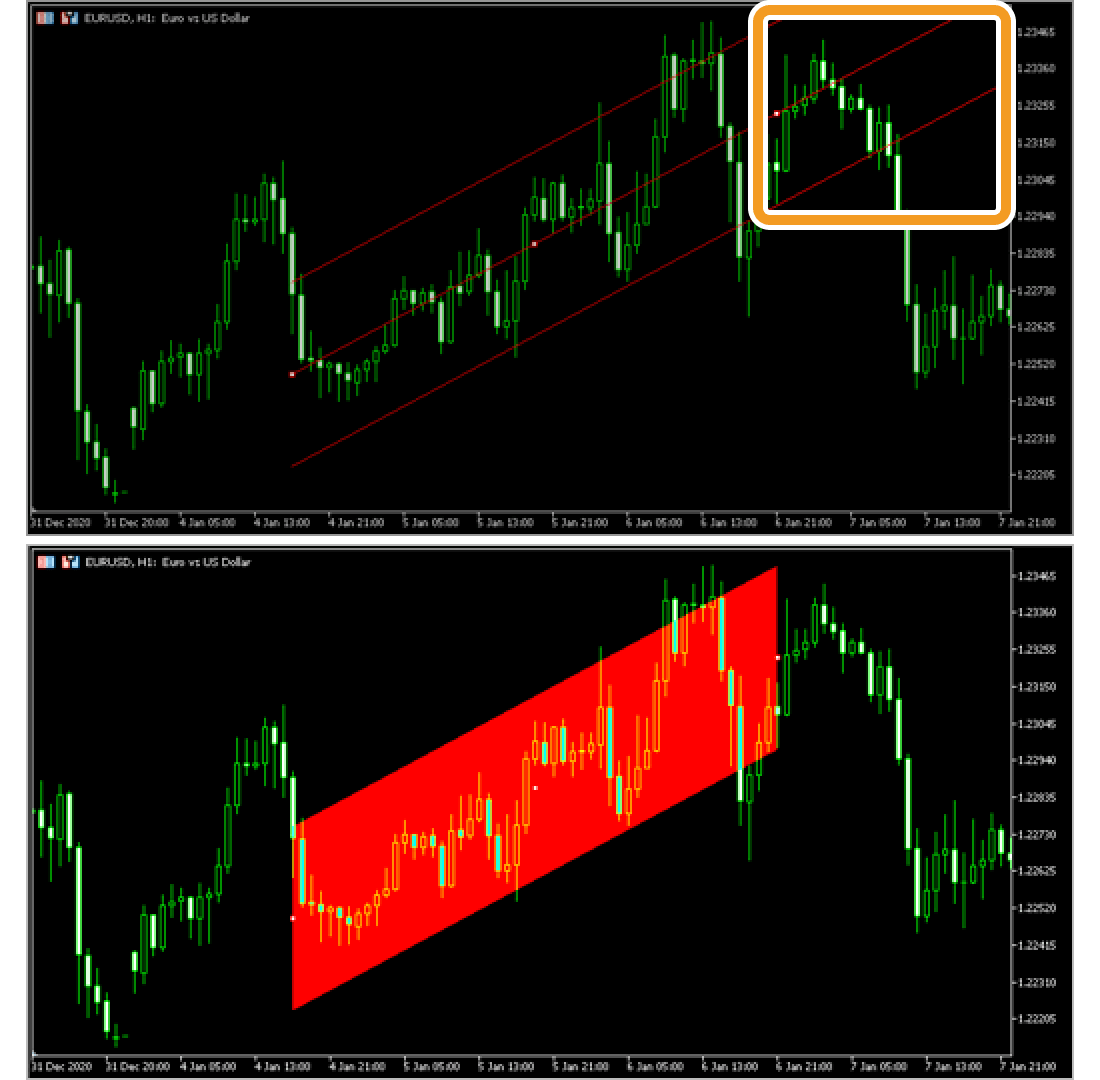
When "Ray right" is checked
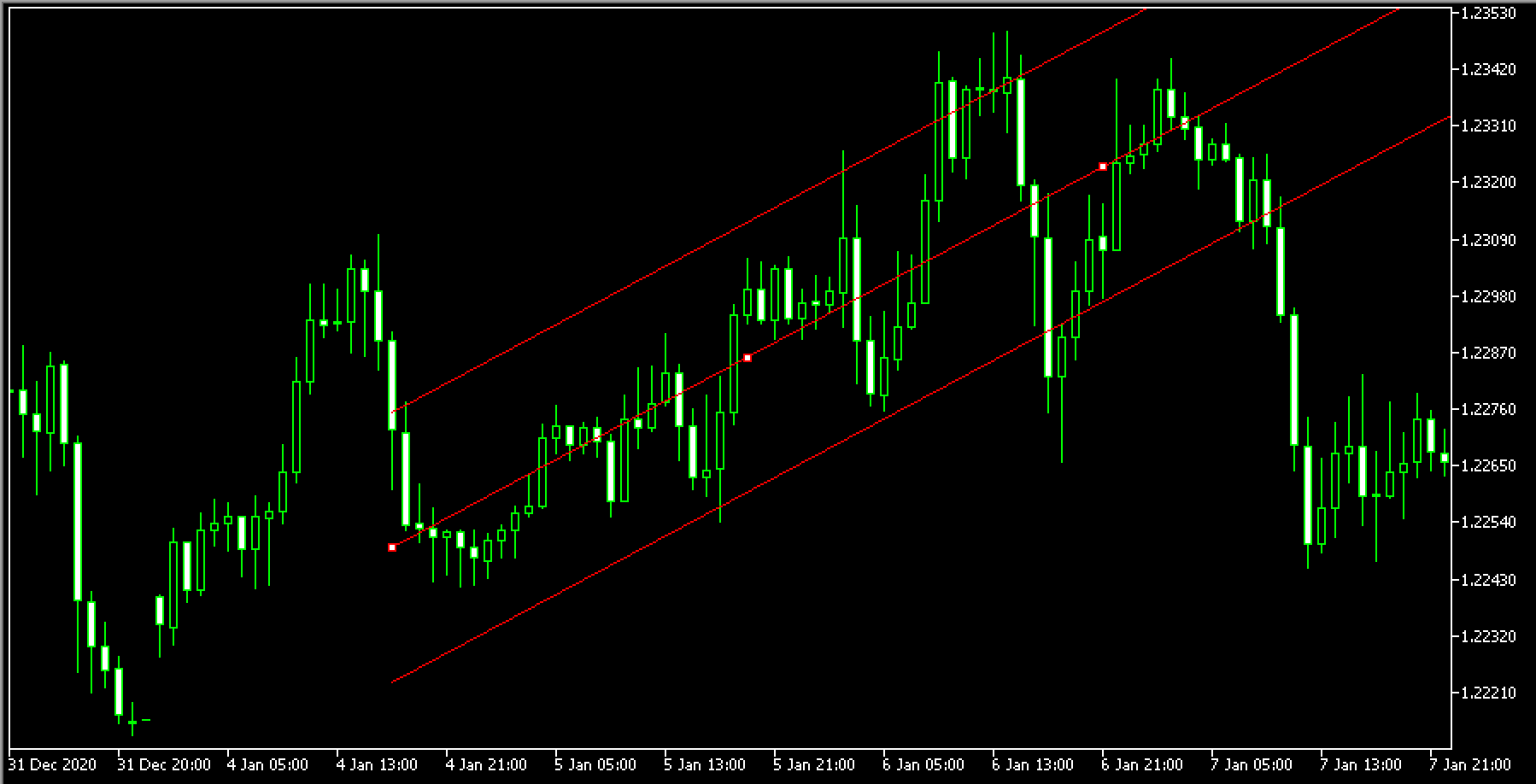
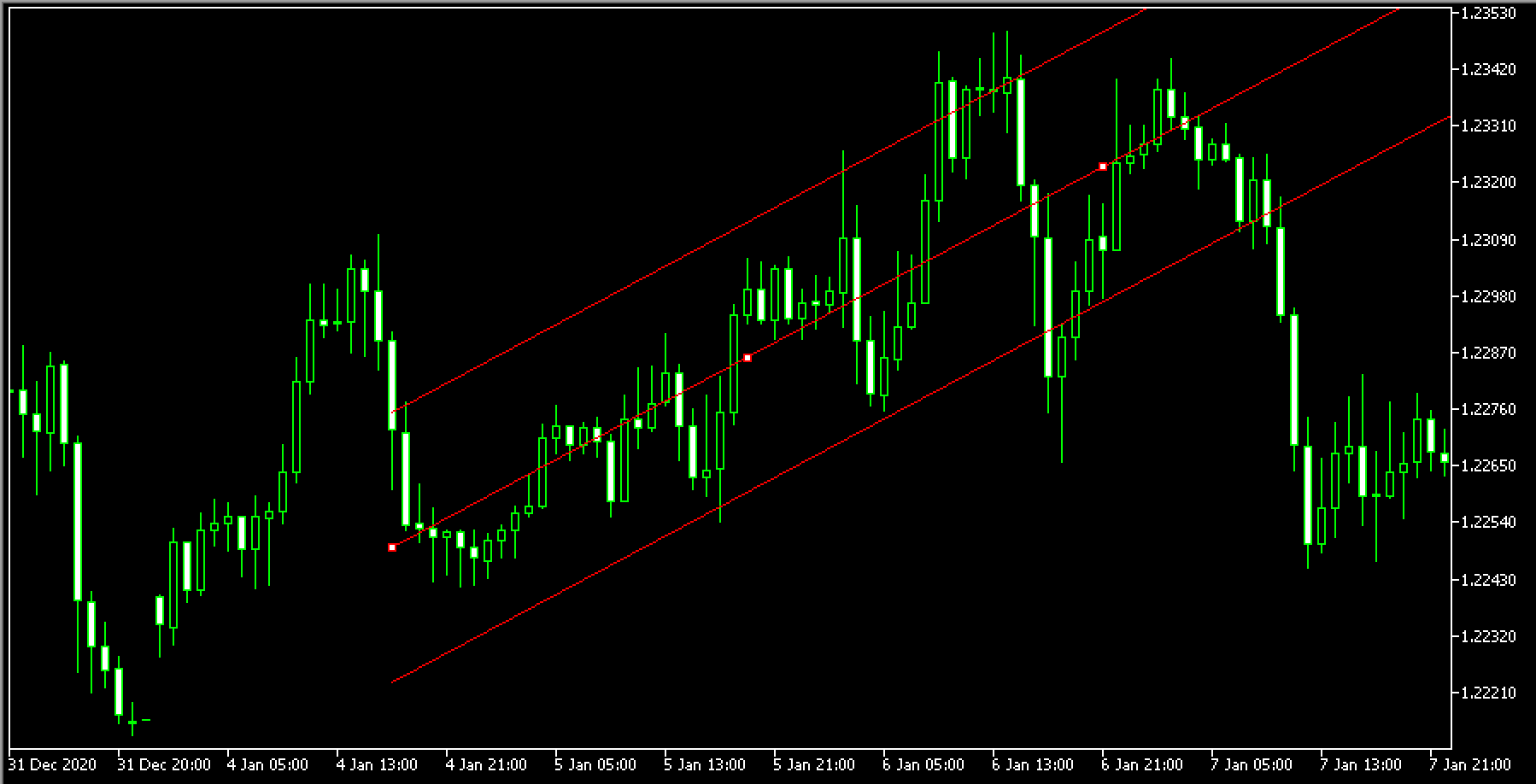
When "Ray left" is checked
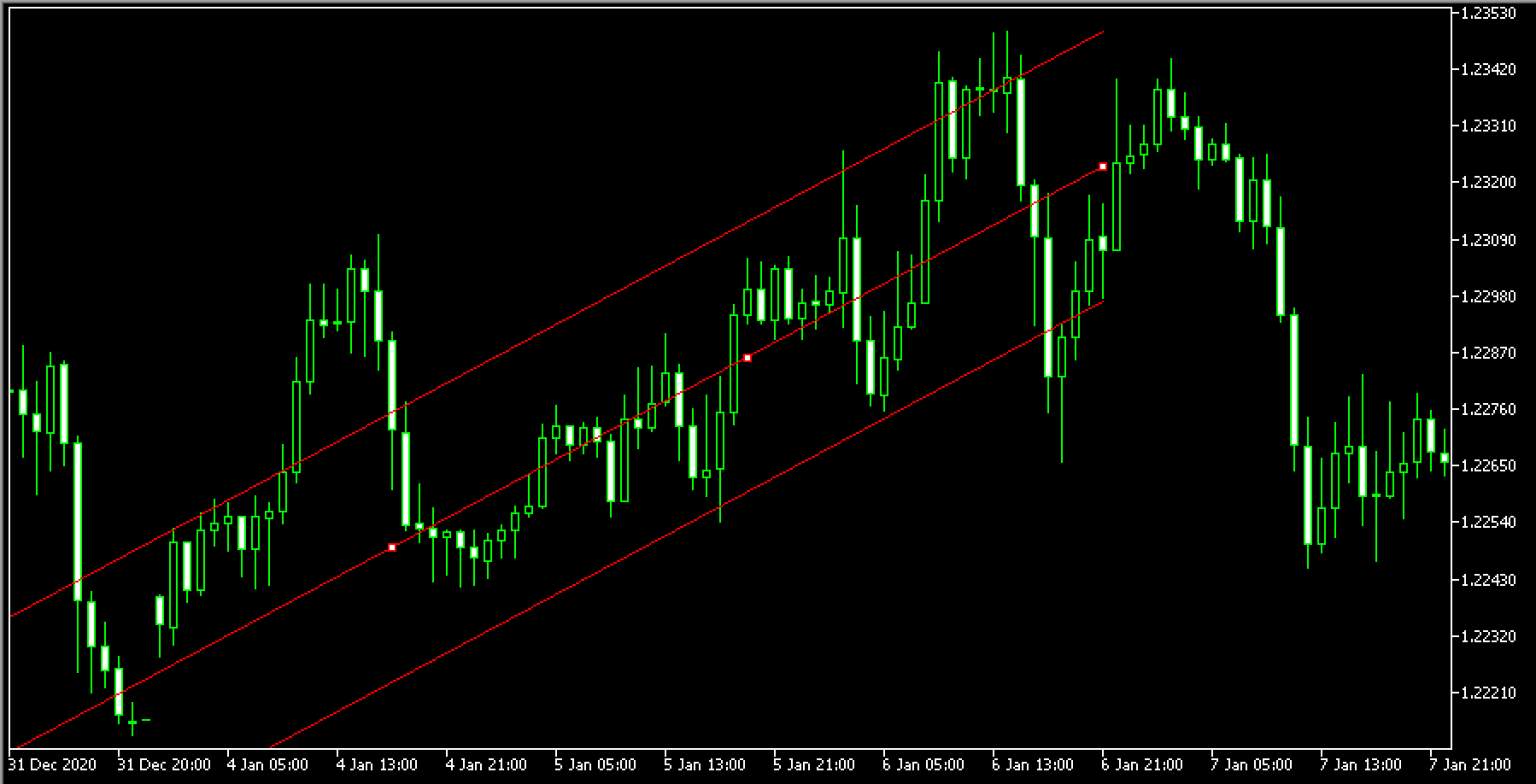
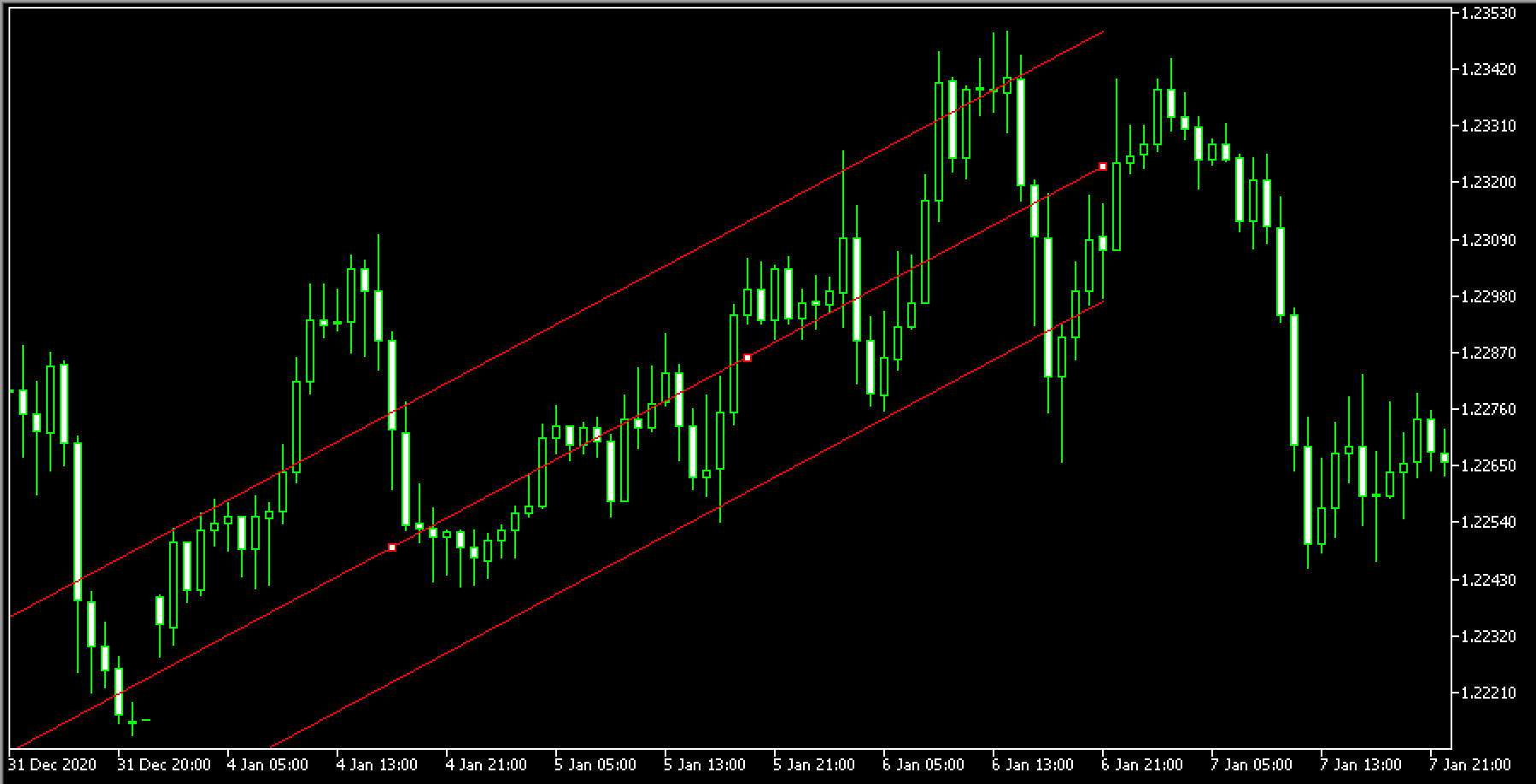
When "Fill" is checked
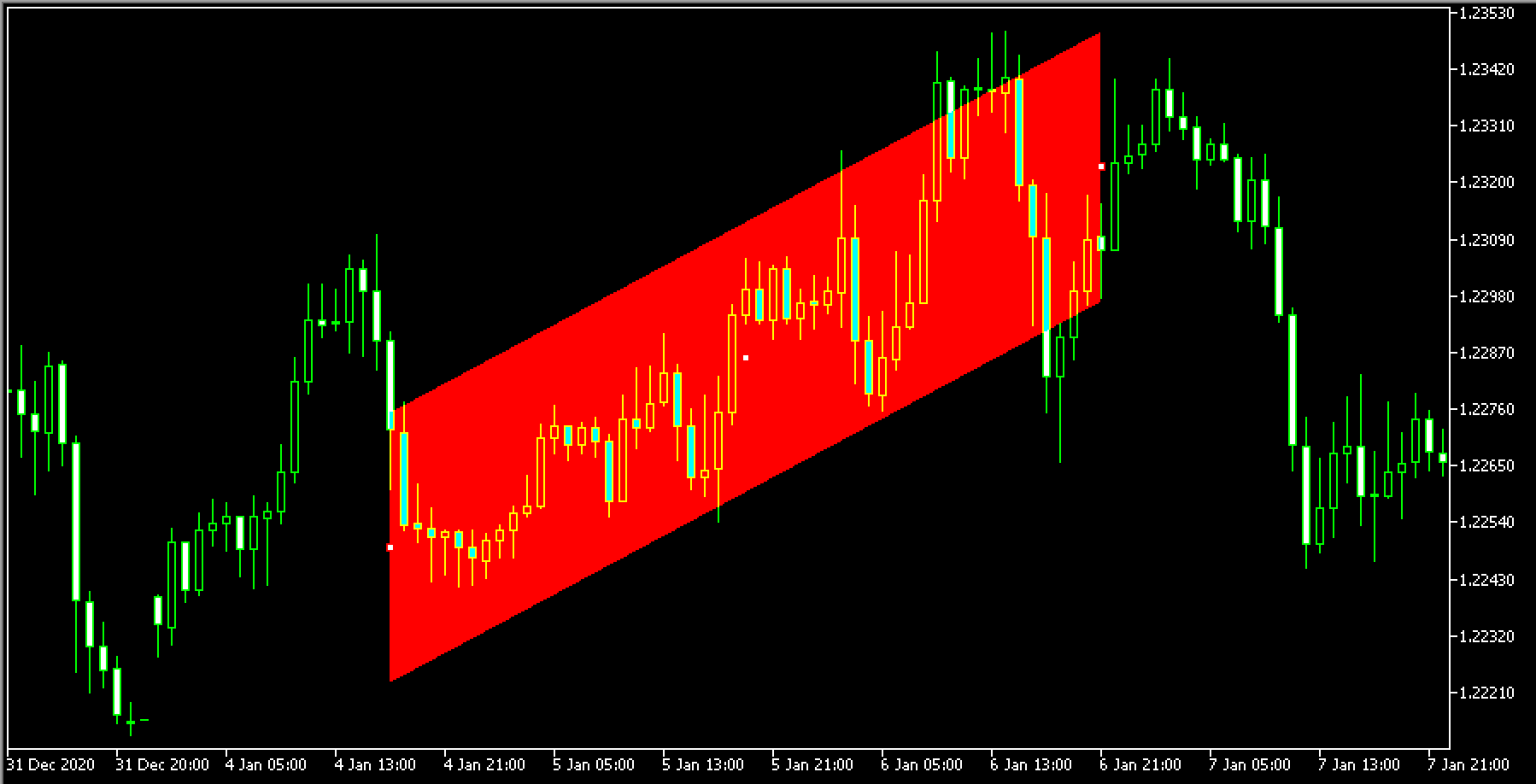
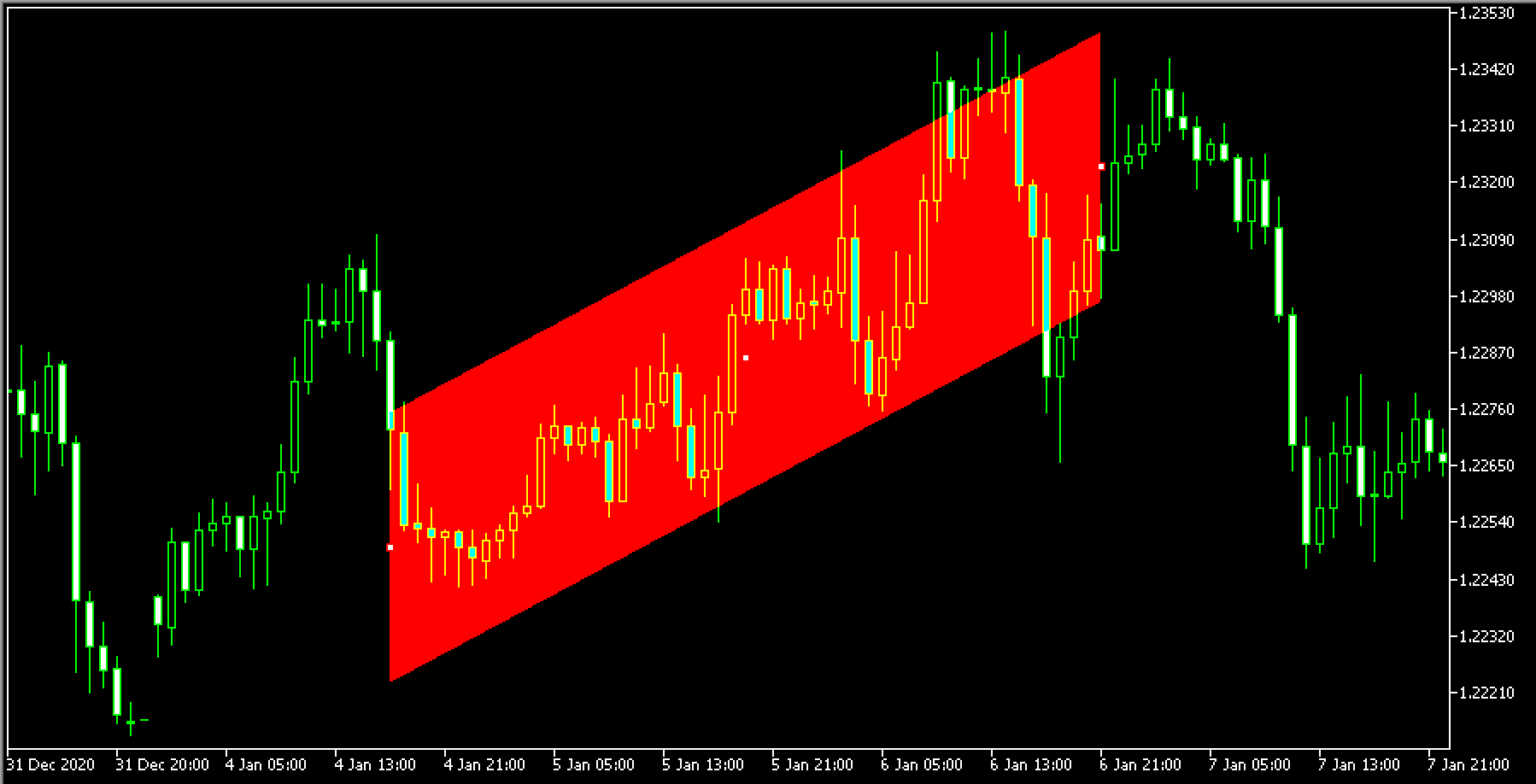
"Visualization" tab
On the "Visualization" tab, you can specify the timeframes to use the standard deviation channel with.
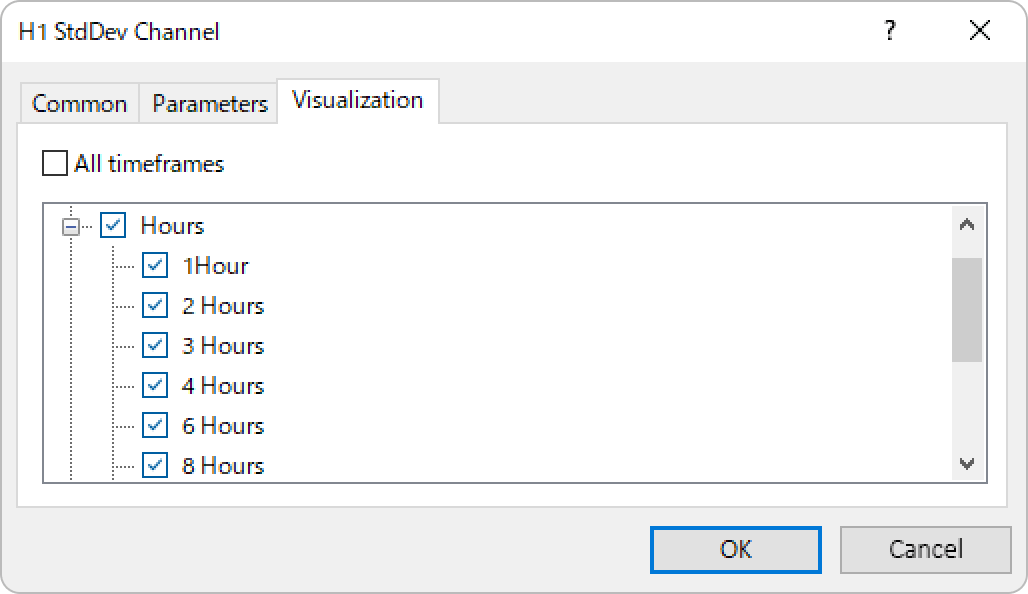
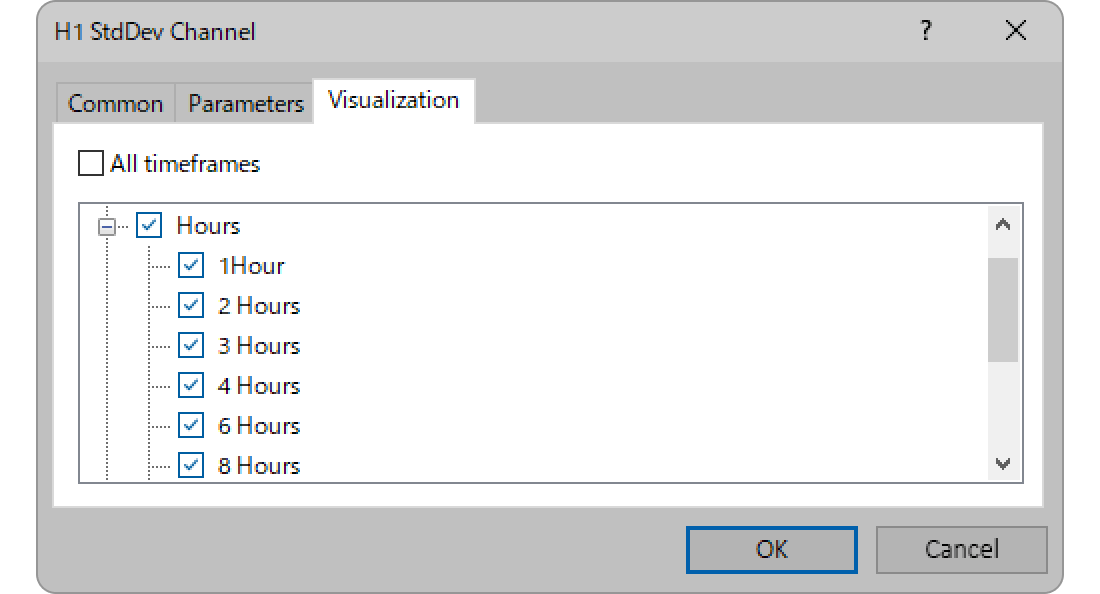
Was this article helpful?
0 out of 0 people found this article helpful.
Thank you for your feedback.
FXON uses cookies to enhance the functionality of the website and your experience on it. This website may also use cookies from third parties (advertisers, log analyzers, etc.) for the purpose of tracking your activities. Cookie Policy
